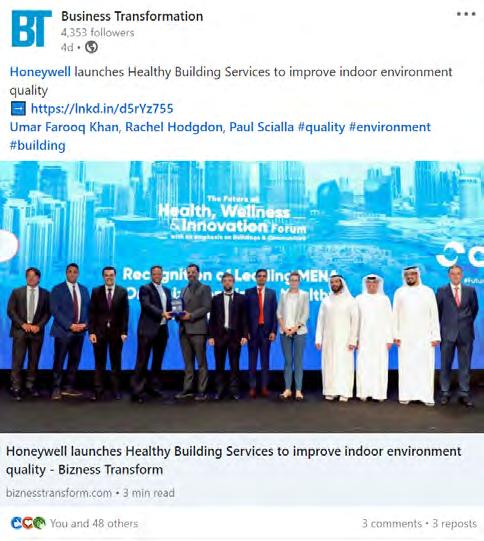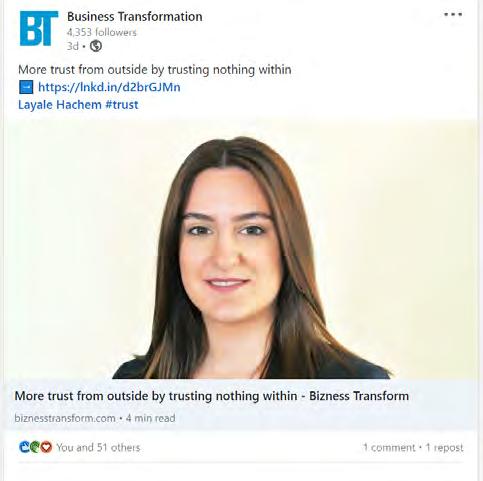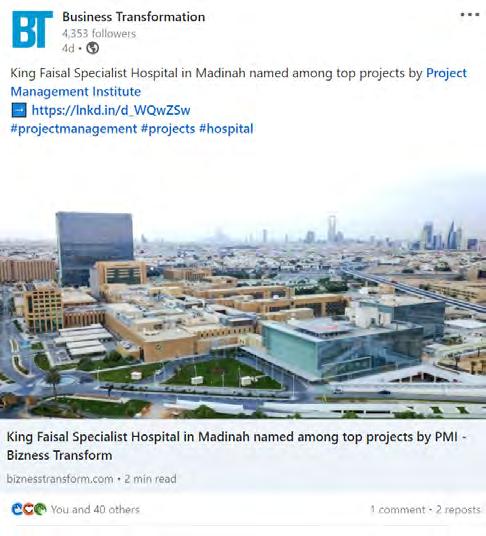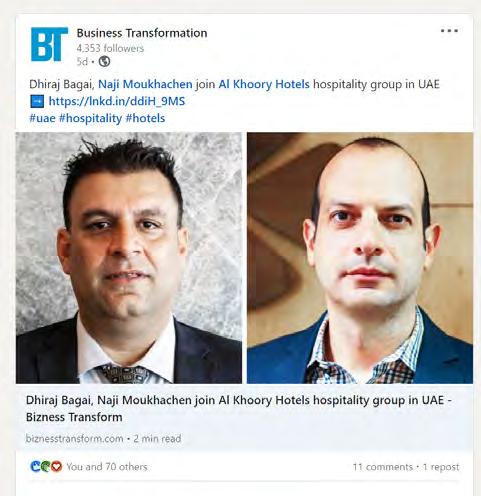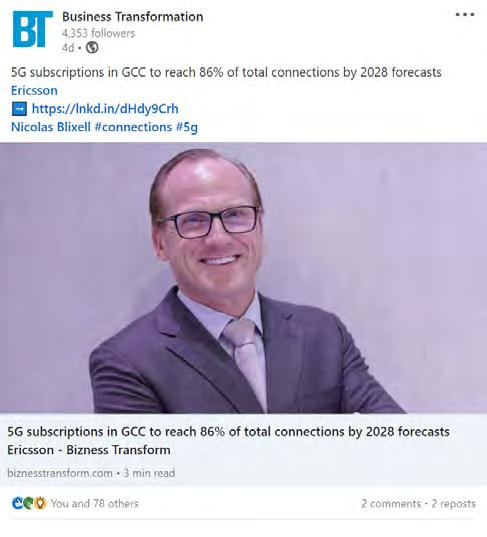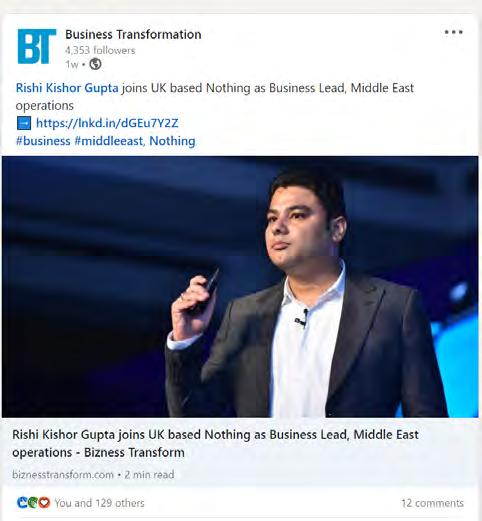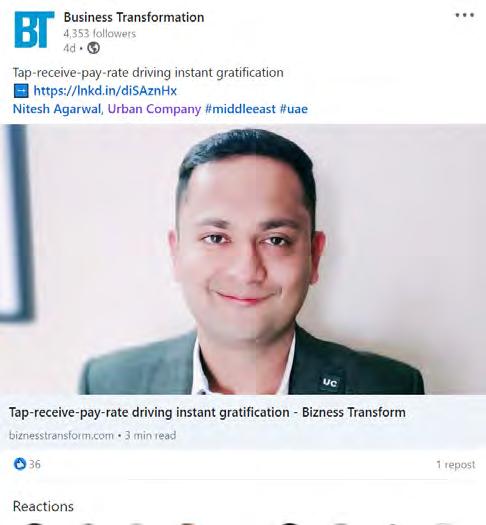MANAGING CHANGE
The UN Climate Change Conference COP27 highlighted the need for global transformation to a low-carbon economy.



The UN Climate Change Conference COP27 highlighted the need for global transformation to a low-carbon economy.


PUBLISHER
Tushar Sahoo tushar@gecmediagroup.com
CHIEF EDITOR
Arun Shankar arun@gecmediagroup.com
CO-FOUNDER & CEO
Ronak Samantaray ronak@gecmediagroup.com
GLOBAL HEAD, CONTENT AND STRATEGIC ALLIANCES
Anushree Dixit anushree@gecmediagroup.com
GROUP SALES HEAD
Richa S richa@gecmediagroup.com
PROJECT LEAD
Jennefer Lorraine Mendoza jennefer@gecmediagroup.com
SALES AND ADVERTISING
Ronak Samantaray ronak@gecmediagroup.com Ph: + 971 555 120 490
DIGITAL TEAM
IT MANAGER
Vijay Bakshi
CREATIVE LEAD
Ajay Arya DESIGNER Rahul Arya
PRODUCTION, CIRCULATION, SUBSCRIPTIONS info@gecmediagroup.com
UAE Office No #115 First Floor , G2 Building Dubai Production City Dubai United Arab Emirates Phone : +971 4 564 8684
USA
31 Foxtail Lan, Monmouth Junction NJ 08852, Ph: + 1 732 794 5918
Printed by Al Ghurair Printing & Publishing LLC. Masafi Compound, Satwa, PO Box: 5613, Dubai, UAE
Published by Accent Infomedia MEA FZ-LLC
Office No #115
First Floor , G2 Building Dubai Production City Dubai United Arab Emirates Phone : +971 4 564 8684
A publication licensed by International Media Production Zone, Dubai, UAE @Copyright 2018 Accent Infomedia. All rights reserved.
While the publishers have made every effort to ensure the accuracy of all information in this magazine, they will not be held responsible for any errors therein.
There were no sensational, block-buster announcements at the end of The United Nations Climate Change Conference COP27 that took place in November 2022 at Sharm elSheikh in Egypt. But there was progress in accepting some of the bare metal tools to make progress.
The Sharm el-Sheikh Implementation Plan, highlights that a global transformation to a low-carbon economy requires investments of at least $4-6 trillion a year. This level of investment is well within the capital earnings of the global private sector. So, what is holding everyone back?
The key here is private-public partnerships, a digital and data approach to help transition to a low or zero carbon economy and public sector legislation to ensure rapid and consistent movement in the right direction.
A digital approach is critical to success in tackling climate change and the energy transition. Data-led technologies are essential to decarbonisation, driving responsible use of the world’s resources and delivering climate-forward products.
The UN’s Intergovernmental Panel on Climate Change indicates that greenhouse gas emissions must decline 45% by 2030 to limit global warming to 1.5°C. To meet the UN Sustainable Development Goals, industry emissions must drop 1.2% each year. Unfortunately, all data points indicate that this trajectory has not yet been achieved.
Implementation of current pledges by national governments puts the world on track for a 2.5°C warmer world by the end of the century. The progress and targets by nations and global enterprises are just not enough at this stage. Moreover, targets set by individuals, homes, small businesses are not going to change this trajectory, as current research is beginning to show. What is needed is a much more significant disruption point.
A fundamental change required for financial institutions is to move away from NPV and focus on the future of the planet, indicates Amish Sabharwal at AVEVA. He also feels that sustainability equals changes brought into demand plus supply plus energy efficiency. Forums like COP 27 are an opportunity to get together, learn, educate, and collaborate amongst each other, he adds.
Data tracked in oil and gas plants by AVEVA solutions is linked to the nature of the hydrocarbon in these plants. So, tracking carbon emissions and helping enterprises to monitor and control these levels is also within the technology maturity of the present-day industrial software and hardware vendors.
Another focus this month in this edition is industry thought leadership into the business outlook for 2023.
Says Rajesh Ganesan at ManageEngine, as technological expertise continues to permeate throughout enterprises, non-IT employees will soon use low, no-code platforms. In the wake of the Great Resignation, some companies assumed it would be easy to find new talent, but that really has not been the case. Continuing to train, educate, foster the careers of existing employees is the best course of action.
Ramzi Itani at Veritas indicates that an AI ML integrated strategy will be essential to tackle the challenges of data management. Solutions will have to use AI ML to self-provision, self-optimise and self-heal.
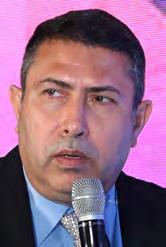
For more on COP27 and the 2023 business outlook turn these pages.
Wishing you the best of business and good health for the year ahead.
Arun Shankar arun@gecmediagroup.com


Bionic energy networks have been successful in tackling these challenges because they leverage the best capabilities of technology and people.
Energy network utilities face two major challenges: power losses that arise from fraud and technical issues, and bad debt that results from customers failing to pay their bills. Many networks struggle with these issues because they do not understand the root causes.

Bionic energy networks have been more successful in tackling these challenges because they take a comprehensive approach that leverages the best capabilities of technology and people. Managing energy losses and bad debt in this way can bring substantial benefits in the long term.
Bionic networks address energy losses and non-payment issues by identifying the root causes across the value chain, end to end. Key to that effort are the following actions, which bionic networks take
in combination with process improvements and change management initiatives.
Bionic networks use an analytics engine to power a dashboard that maps assets, energy flows, and transmission losses in realtime. These tools enable companies to identify and localise where major energy losses are occurring, detect imbalances between the total amount of energy supplied and consumed, and segment customers by consumption level.
Predictive models make it possible to identify many fraud cases with limited inspection resources. They can also help
detect power losses resulting from an infrastructure setup or upgrade, which can create inconsistencies across databases. The predictive models, which typically use more than 100 data variables from the field, self-correct by adjusting the search parameters.
B2B fraud-detection engines often identify power theft among business customers by comparing actual energy consumption with predicted consumption. And B2C engines typically identify power theft amongst residential customers based on customer or neighbourhood data. Networks use this information to determine which inspections should be done first.
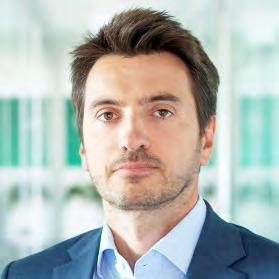

CAPEX prioritisation tools help bionic networks determine which assets and IT systems should be upgraded to cut energy losses and which technological solutions should be invested in to prevent theft. These tools include equipment that can detect taps on wires and aerialbundled cables that short-circuit when hooked up through an illegal line.
Bionic networks use predictive analytics to reduce collection costs, increase proceeds, and speed up the collection process—all while keeping the customer experience positive. A collection customisation engine segments customers according to their payment propensity. Since such an engine operates in real-time, it is able to identify the most suitable and effective collection action for each customer.
l Bionic energy networks have a good understanding of their potential to reduce energy losses and debt related to non-payment.
l Bionic networks develop a structured incentive system for meterreading crews, especially in neighbourhoods flagged by the engine.
l Predictive models make it possible to identify fraud cases with limited inspection resources.
l They can also help detect power losses resulting from an infrastructure setup or upgrade.
To ensure that their digital solutions are successful, bionic networks also put in place the needed human capabilities via the right organisation structure, processes, skills, and talent. When implementing a frauddetection engine, for example, bionic networks develop a structured incentive system for meter-reading crews, especially in neighbourhoods flagged by the engine.
When implementing new processes for improving collections and reducing energy losses, bionic networks launch actions through the optimal channel, digital or humanassisted, or both to maximise the chances of payment and the detection of theft.
To optimise the effectiveness of call centre agents, the networks provide them with key information
about the customer, AI-driven recommendations, dynamic scripts, and simulation engines, all of which help steer the interactions. After systematically validating what works well for each customer group and retraining the AI algorithms with information gleaned from industrialised feedback loops, these networks create a rich catalogue of potential actions that agents can take to improve results.
Bionic energy networks have a very good understanding of their potential to reduce energy losses and debt related to non-payment, and they can develop a portfolio of coordinated initiatives and clear CAPEX-allocation criteria. This portfolio includes clear and realistic reduction targets, a prioritised plan with accountability and KPIs, an optimised allocation of required investments, and employees committed and empowered to drive change. Other networks would benefit greatly from this approach. n
B2B fraud-detection engines often identify power theft among business customers by comparing actual energy consumption with predicted consumption
This is the foundational layer for any ecosystem that enables an organisation’s cybersecurity to truly align with its business and IT objectives.
Digital platforms have become increasingly significant in our lives. In McKinsey’s latest tech trends outlook for 2022, this is referred to as the multiplying effect of combinatorial innovation as different technologies now converge in seismic and unforeseen ways. With Web 3.0 on the horizon, we will see advances in artificial intelligence and machine learning at a breathtaking pace.
With this convergence comes an increase in associated cyber risks. Data breaches in the Middle East have reached an all-time high this year of over $7 million per data breach on average, according to recent estimates. Meanwhile, attacks on government entities and private businesses
continue to grow in frequency and complexity and government leaders are now stressing cybersecurity as a sovereign priority.
The good news is that organisations are generally containing these incidents faster and more effectively than ever before. The formation of alliances such as the UAE Cyber Security Council and the National Cybersecurity Authority in Saudi Arabia is certainly beneficial. But rather than only containing incidents, how can individual companies lower the likelihood of security incidents overall?
Unfortunately, the threat landscape is too complex for most businesses to navigate independently. The pandemic exposed significant shortcomings in many organisations’ cyber
ecosystems. That said, no one has to confront these issues alone.
This is why the market for assessment-based trusted advisory and risk services, TARS is now growing at an unprecedented rate. The tenet behind these services is to enable any business in any industry to make more informed decisions. It is the foundational layer for any ecosystem that enables an organisation’s cybersecurity to truly align with its business and IT objectives.
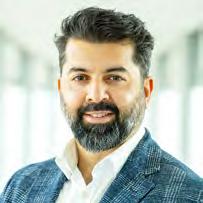
More specifically, the attractiveness of TARS assessments stems from addressing three principal concerns.
within, whether government, financial, healthcare or energy market.
l Trusted advisory assessments and trainings aimed at the human factor have been shown to bring profound reductions in cybersecurity risks.
l Good news is that organisations are generally containing these incidents faster and more effectively than ever before.
l Most companies in the region are now confronting a sizeable amount of information security and data privacy regulations, locally and from abroad.
Understanding the difference between malware, cyberattacks, and human error is surely important. Yet threat sources, as well as the impact and likelihood of exploitation, can vary widely based on an organisation’s size, industry, and its future ambitions. Too often a risk strategy looks only at the here and now. The more prudent approach considers a sustainable strategy that is tailored to one’s current business yet is flexible enough to incorporate new risk profiles and evolve as the company moves across borders, expands its workforce, and diversifies its services.
Most companies in the region are now confronting a sizeable amount of information security and data privacy regulations, locally and from abroad. The legislation behind these policies is constantly changing, too. The demands on your organisation are specific to the sector that your organisation operates
As such, today’s assessment services are not just about eventually meeting compliance standards. Understanding the landscape and staying ahead of new regulations can actually provide one’s business with a substantial competitive edge.

Even when organisations have top-notch, well-written security processes, many do not invest enough in improving the human layer of the cybersecurity chain. According to an IBM study, human error is the main cause of 95% of cybersecurity breaches. Trusted advisory assessments and trainings aimed at the human factor have been shown to bring profound reductions in cybersecurity risks.
They do this by identifying and prioritising where human error could have the greatest impact, then developing the knowledge required to proactively recognise threats— not just defend against them.
To conclude, organisations that invest in improving their cyber maturity through trusted advisory and risk services are able to not only secure their present, but are better able to explore the future with peace of mind. n
According to an IBM study, human error is the main cause of 95% of cybersecurity breaches

New research published from Boston Consulting Group shows that while 94% of companies have big aspirations to deliver substantial and rapid impact from digital transformation, and companies plan to increase investment in digital transformation in spite of global economic headwinds, the majority of these digital transformations fail to achieve their objectives.
Titled “Mind the Tech Gap,” the study is based on a survey of nearly 2,700 executives
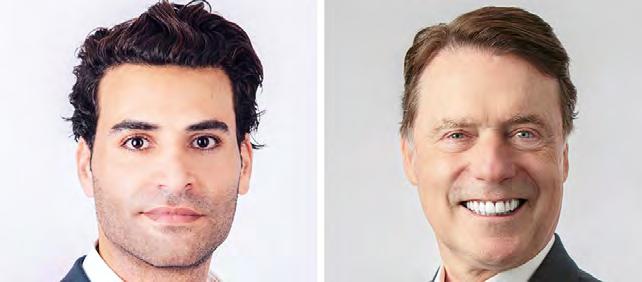
driving digital transformations in companies across 13 countries and a wide range of industries. Despite a tightening global economy, the survey also finds that 60% of companies plan to increase their spending on digital transformation in 2023 vs. 2022, with business model transformation and sustainability as the top two areas for future investments.
The survey revealed five key challenges in establishing and executing digital transformations: l Making the right choices
among disruptive technologies— top three cited are advanced AI, blockchain, and IoT
l Reaching scale fast with new digital solutions
l Recruiting digital talent—top three hardest tech roles to fill are experts in advanced tech, software engineers, and data scientists
l Prioritising investment and development
l Managing the cost and uncertainty of return on investment
Additionally, respondents expressed concerns and pain points regarding the ecosystem of tech partners and vendors. These include cumbersome coordination across vendors, ~85%; cookie-cutter solutions, ~75%; and lack of help in prioritising steps of the transformation, ~70%.
To help clients respond to these challenges and address these pain points, BCG has launched BCG X, a hybrid tech build and design unit that brings together nearly 3,000 technologists, builders, and designers.
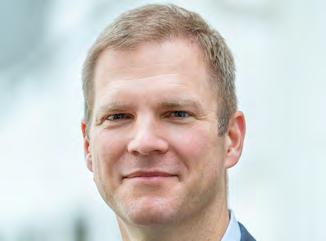
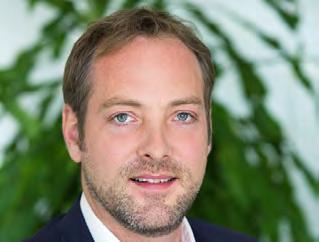
Arthur D Little, a management consulting firm, released an exclusive report exploring banking as a service BaaS and its competitive opportunities for the Middle East region. To date, the BaaS market has remained relatively small and largely at the preserve of digital banks, FinTechs and digital nonfinancial platforms. However, as their traditional markets and margins come increasingly under threat from disruptors, BaaS will be the route to salvation for many incumbent banks.
The report, titled ‘Banking as a Service: at the Heart of the Bank of Tomorrow’ outlines the many signs that BaaS is being adopted by small
and midsize banks operating at subscale and, as more do, this segment of the market will grow at a compound annual growth rate of approximately 25%. That
would mean that, by 2026, revenues in the region from BaaS could stand at $5 billion or approximately 4% of the total banking income in the Middle East.
Technology Innovation Institute, a global scientific research centre and the applied research pillar of Abu Dhabi’s Advanced Technology Research Council, announced its Directed Energy Research Center has secured a major milestone in the rapid advancement of fibre laser technology.
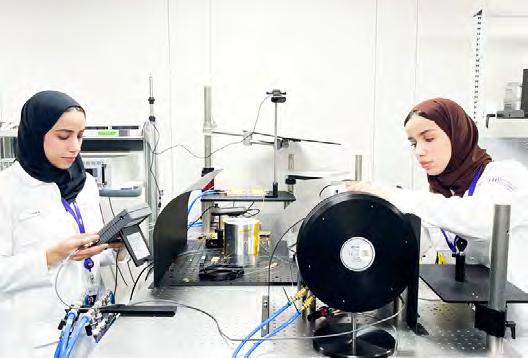
The introduction of the first high-power fibre laser
in the MENA region, a kW-level Ytterbiumdoped fibre laser, entirely designed, assembled, and tested in the UAE – validates the excellent operational performance of its proprietary state-of-the art fibre laser development platform, and confirms the world-class skills and expertise of the DERC researchers and engineers involved in successfully propelling the UAE as a key player in high-power laser sources.
Under the leadership of Dr Giuseppe Scurria, Lead Laser Researcher, the project entailed building a state-of-the-art optical laboratory for fibre laser development and optical fibre processing, developing unique local capabilities and competences on optical fibre shaping and processing, acquiring industry best practices and updated theoretical advances on fibre laser technologies, and establishing strong commercial relationships with worldrenowned laser and photonics companies.
The international team of expert researchers and engineers that made the feat possible include Jawaher Al Ameri, Taif Alhmoudi, Asma Al Ahmadi, Reem Al Ameri, and Amit Dubey.

data and insights including visual representation of products and services, real-time customer experiences, opportunities for revenue generation for brick-and-mortar industries and experiential commerce seamlessly integrated to existing payment gateway.
Geidea, a fintech company has partnered with Magnati, a provider in the payments solutions industry – to enable merchants to provide seamless customer experiences in Magnati MetaV – the first metaverse marketplace in the MENA region. Magnati MetaV is a virtual platform where people can get a visual and sensory experience as they shop, learn, play games, attend events and more online – all from the comfort of their homes.
Geidea and Magnati aim to elevate the retail experience by providing merchants with tailored
Customers can view and interact with retail offerings in three dimensions using customisable avatars in an online environment. A variety of retail categories, including fashion, food, gaming, and technology, will be available for customers to browse, pick up, try on, and buy. Customisable avatars enable users to explore a discovery-driven online environment where merchants and consumers can see and feel retail offerings in multi-dimension.
The platform is fully integrated with traditional payment rails and gateways, so that shoppers can pay for products and services on Magnati MetaV through cards, wallets and other accepted payment methods, for a completely familiar payment experience.
TII introduces kW level,Ytterbiumdoped fibre laser designed, assembled in UAE
Award-winning AI-based global hiring platform Techfynder has revealed the most in-demand jobs across sectors in the United Arab Emirates. It coincides with a move by the Irish firm to boost its operational coverage in the UAE to build further upon the

rise in demand for its services from both employers and jobseeking candidates in the country which already sees over 100,000 candidates registering on the platform.
With over 250 UAE employers registering their job opportunities
on Techfynder, the rapidly growing pool of employers is expected to grow further as the country’s employers look to the platform to support their talent pipeline to fuel their increasing needs for skilled employees.
Sectors such as IT, pharmaceuticals, and engineering have emerged as the top sectors that employers are currently hiring for, with a growing demand for tech professionals of all types across industries, with hundreds of tech positions advertised and an evergrowing database in the region.
The tech sector is one of the most in-demand currently in Dubai, while accounting and retail were amongst the top-most hiring sectors in Abu Dhabi. Engineering, logistics and manufacturing also topped the list in Sharjah, Ras Al Khaimah, Fujairah, Ajman, and Umm Al Quwain.
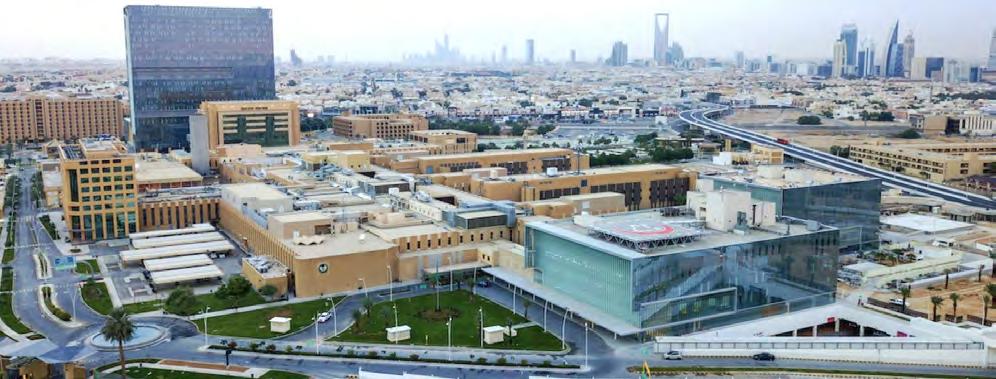
King Faisal Specialist Hospital and Research Centre in Madinah has been named among the top three projects in the world by the Project Management Institute under the Large and Mega Projects category. PMI is the leading professional association for project management and the authority for a growing global community of millions of project professionals and individuals who use project management skills.
The Large and Mega Projects category recognises complex projects that best deliver superior performance of project management practices,
excellent organisational results, and a positive impact on society. KFSH&RC Madinah’s global recognition is a testament to its administrative system’s efficiency and effectiveness. Furthermore, PMI also evaluated KFSH&RC Madinah’s services according to the latest international standards.
The hospital received several honorary mentions at the Global Project Management Institute Summit that was held between 1 and 3 December in Las Vegas, USA. The summit was attended by the largest community of changemakers, leaders, and project professionals committed to making ideas a reality.
Al-Futtaim’s Trading Enterprises, the official representative of Volvo Cars in the UAE, will be introducing the much-anticipated EX90 flagship electric SUV in 2024, slated to be the brand’s safest creation till date.
Ushering a new era of safety and reliability, the new Volvo EX90 all-electric flagship SUV, endorsing the brand’s commitment to providing the highest standards in road safety. Innovation remains the brand’s key driving force and is reflected in every facet of this
vehicle. Included in this forthcoming model, is the new radar system that ensures that no one gets accidentally left behind in the car.
Continuing its legacy for being a brand that has been a beacon of safety in the automotive industry, Volvo cars aims to protect more lives, in line with the brand’s purpose. The EX90 is the start of a new era for Volvo Cars, taking their unrivalled legacy of safety, quality, and innovation into the future.
A new interior radar feature developed by engineers is designed to be accurate and sensitive enough to detect the tiniest movements at sub-millimetre scale –such as those of a sleeping toddler. It’s the first such feature to cover the entire interior of the car, including the trunk.
With sensors integrated in the overhead console, the roof-mounted reading lamps and the trunk of the car, our new system is the first that can detect sub-millimetre movement in the entire interior of the car. To cover as much of the cabin as possible and sense whether a child or pet has been left in the car, we’ve spaced radars throughout the cabin from front to back, including the rear trunk.

the MENA region.
Under the partnership, members of the MBRIF Innovation Accelerator programme will be granted discounted lease rates, license and processing fee waivers for the first year and access to all business activities in DSO, enabling them to engage with the largest network of SMEs and technology entrepreneurs from around the world in the region.
Mohammed bin Rashid Innovation Fund, an initiative launched by the UAE Ministry of Finance to support nationwide innovation, has partnered with Dubai Silicon Oasis, the free zone technology park and member of Dubai Integrated Economic Zones Authority, to support emerging technology start-ups in the UAE through Dubai Technology Entrepreneur Campus, the largest tech hub and co-working space in
The agreement also provides flexible terms for visa processing and activity lists where MBRIF members will not be restricted to the activity list at Dtec but instead have access to all business activities in DSO.
The partnership emphasises the significance of joint efforts to provide technology startups with the opportunity to network and collaborate and contribute to UAE’s National Innovation Strategy and economic growth.

Hub71, Abu Dhabi’s global tech ecosystem, and The Mohammed Bin Salman Foundation, MiSK Foundation have partnered to ease international market access for startups and technology companies between Abu Dhabi

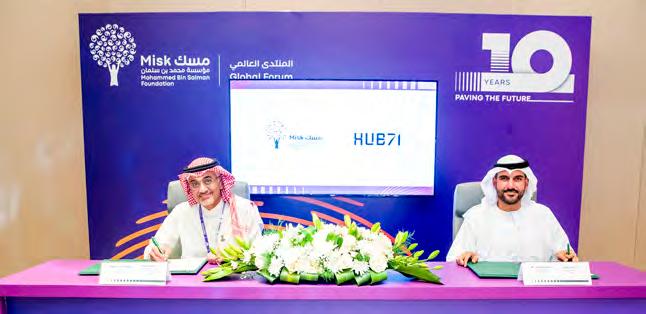
and Saudi Arabia.
The partnership will benefit founders seeking a soft-landing into the Saudi Arabia or Abu Dhabi technology ecosystem, with access to value creation programs, incentives and
investors, corporate and government partners. Through Hub71 and MiSK’s extensive partner networks, high growth tech companies will gain easier access to Abu Dhabi’s global tech ecosystem or Saudi Arabia’s thriving market with dedicated relocation service support covering, visas, licensing, and introductions to investors and partners for fundraising opportunities to support business development and ease the start-up journey.
Talent development is also a key aspect of the partnership, providing founders with the ability to take advantage of talent sourcing programs, workshops, masterclasses, and training provided at MiSK Foundation in Riyadh, and the opportunity to collaborate with Hub71 and MiSK’s university partners.
Hub71, Abu Dhabi’s global tech ecosystem, announced it has on-boarded startups to its community that have raised $1 billion in venture capital collectively since its launch in 2019. The milestone was achieved in a year which has seen Hub71 onboard 53 high growth technology companies each with a proven track record of attracting largescale investment from leading venture capital firms. Nine startups onboarded by Hub71 this year have raised more than $10 million, AED 36.7 million in funding each, $156.7 million, AED 575 million collectively. This includes Axiom, a start-up that helps companies monitor and analyse data, raised
$25 million, AED 93.6 million, the highest of any start-up onboarded by Hub71 in 2022, and 257 per cent more than the highest amount raised by a startup joining Hub71 in 2021. Additionally, Earthshot Prize winner, 44.01, a carbon reduction company eliminating CO2 by transferring it into rock, had already raised $16.2 million, AED 59.4 million upon joining Hub71 within its latest cohort. This follows 2021, in which the highest amount raised by a start-up joining Hub71 was $1.9 million, AED 7 million and the average fundraise of startups joining the community amounted to $463,000, AED 1.7 million.
Hub71, Mohammed Bin Salman Foundation’s MiSK partner to
Nine HUB71 based start-ups collectively raised $157M in 2022 led by Axiom, Earthshot Prize
In line with its vision of building a world-class R&D hub in Abu Dhabi, ASPIRE, announced four Visiting International Professorships. With AED10 million of research funding, the program has attracted the highest-caliber researchers from leading global institutes
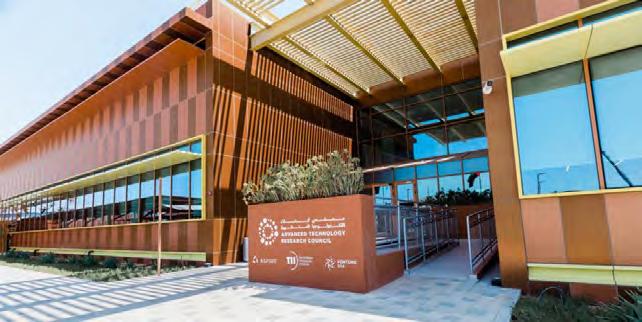
to build international networks and further advance meaningful research in priority areas for the Emirate.
Khalifa University will host two ‘Established Researcher’ ViPs, who possess extensive international credentials in their research areas. Professor Hany
Farag, with expertise in sustainable transport solutions, will join KU from York University, Canada. During his tenure at KU, he will collaborate on research focused on distributed energy resources, such as electric, gas, and hydrogen transport systems, to implement a unified smart energy framework.
The second ViP to be based at KU is Professor Huai Wang, from the University of Aalborg, Denmark, who holds expertise in the research field of power electronics.
The United Arab Emirates University, UAEU and Zayed University, ZU are to host two ‘Rising Star’ ViPs. These professorships are aimed at midcareer scholars with established reputations in their focus areas; these awards will offer them the opportunity to scale up and further advance the scope of their research.
Women leaders emerged as significantly more peoplefocused and empathetic than their male counterparts, with 64% of UAE women prioritising investment in developing their workforce’s skills and capabilities compared with a mere 24% for men, who are instead prioritising buying new technology. This is according to the latest edition of the KPMG 2022 Women Business Leaders Outlook, which surveyed women leaders from 50 countries, including the UAE.
Three quarters of UAE women leaders, 72% also felt their organisation has a responsibility to help with reskilling the workforce to avoid lay-offs, compared with 60% of men.
The survey found that UAE
women leaders are reconfiguring and securing the supply chain, advancing digitalisation, connectivity, and cyber security resilience as a top priority. This differed from the priorities outlined by UAE male CEOs, who cited digitalisation as a top priority, followed by inflationproofing capital and input costs, and improving the employee value proposition to attract and retain talent.
UAE women leaders are confident of their business prospects as they pursue aggressive M&A strategies, with 74% saying new partnerships will be critical to continue the rapid pace of digital transformation post pandemic.

More than half of the UAE
women surveyed also felt their companies needed to be more transparent regarding equal pay. As many as 82% believe a lot more needs to be done to build gender diversity on boards and management levels, and 62% experienced stereotyping and bias in their day-to-day work.
Encouragingly, the UAE Government is introducing sweeping measures to increase female representation in the C-suite, with recent studies showing a growth in female leadership in UAE boardrooms over the past two years.
Women leaders more people-focused and empathetic than male counterparts finds KPMGMarketa Simkova, Partner and Head of People and Change at KPMG Lower Gulf.
SunMoney Solar Group, which runs the world’s largest Community Solar Power Program, has recently opened applications for its own valueproducing asset-backed cryptocurrency token, the SDBN2 token, after successfully selling all the SDBN1 tokens introduced earlier.
The SDBN2 token is a digital currency that is based on the Smart Digital Business Network business model, which was designed to offer financial assistance and support for businesses and individuals that wish to transition to solar energy. This cryptocurrency is backed by the increasing solar power-producing capacity of the SunMoney Solar Group.
The SDBN2 token provides investors with a unique opportunity to invest in a physical, real-world asset with lasting value. Not only does it provide an efficient way to manage and store energy, but it also automatically generates wealth for its holders through dividends on a
monthly basis.
In addition, users have access to real-time energy data and analytics that can be used to make informed investment decisions. For those looking to capitalise on renewable energy sources, investing in the SDBN2 token is a great option. With an established infrastructure and reliable guarantor system, this digital currency has immense potential for growth and profit.
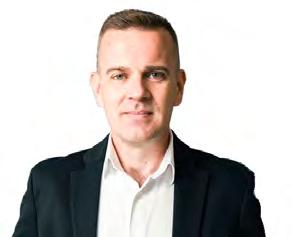
SDBN2 token purchasers will benefit from a steady, monthly passive income generated through the company’s available solar power plant capacity. This is enabled by a state-of-the-art Artificial Intelligence, AI system that optimises the use of sunshine to maximise yield.
The AI also handles reinvestment, allowing for part of the income generated to be used towards purchasing more solar capacity. This provides an opportunity for compounding returns and increasing one’s overall income without any extra effort required on their part.
Majid Al Futtaim has signed a deal with Immersive Gamebox to introduce seven hyper-immersive and interactive ‘Gameboxes’ to Magic Planet in City Centre Mirdif, Dubai and City Centre Al Zahia, Sharjah, giving visitors access to 12 different experiences. The partnership underscores Majid Al Futtaim’s commitment to evolving and diversifying its offering in line with customer preferences and emerging trends.

IGB, formerly known as Electric Gamebox is a leading immersive gaming company which designs and develops interactive digital smart rooms called ‘Gameboxes’, catering for groups of two to six players per Gamebox. The platform is a completely new genre of group entertainment featuring cutting-edge technologies, including patented touch screens, 3D motion tracking and surround sound to deliver a hyper-immersive shared gaming experience.
IGB has a growing library of licensed and original IP games created by its in-house studio. All titles will
be available at Magic Planet including Alien Aptitude Test, Ticket to Mars, Psychedelic Mansion, James Bunny: Casino Tropicale, and Squid Game lasting 60 minutes each, as well as Temple of Coins, Angry Birds, Block Smash Mania, Trivia Mash-up, lasting 15-30 minutes each and kids’ games including Temple of Coins Junior, Tip Tap Memory Challenge and Shaun the Sheep: Championsheeps, lasting 15-30 minutes each. IGB will also be providing localised versions of these games in Arabic.
Majid Al Futtaim, Immersive Gamebox to launch seven hyper-immersive rooms at Magic Planet
Educatly, a Dubai-based start-up that connects students to global higher education opportunities, has witnessed a significant growth in platform users
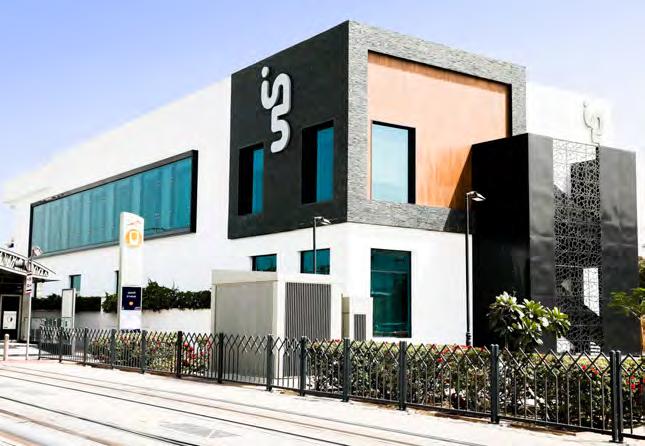

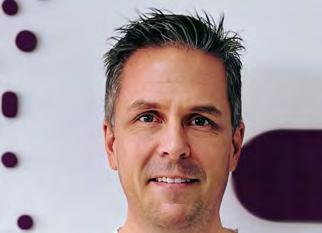
between January and September of 2022. Based out of in5 Tech, a business incubator by TECOM Group, Educatly’s community of students has increased by
five times, from 100,000 to 500,000 in the past nine months and represents more than 150 countries and territories.
Inspired by LinkedIn’s platform, Educatly’s aim is to simplify the process for students to study abroad, this will help attract more international students to Dubai while connecting students from the region to global universities.
In addition to the substantial growth in users, 2022 has been marked by several milestones for the tech start-up, which was founded by former LinkedIn employees in 2020. Educatly has cast a wider net across the higher education industry to feature more than 3,000 universities on its platform and secured active recruitment agreements with 500. It also welcomed Head of LinkedIn’s MENA and EMEA growth markets, Ali Matar, to its Board of Advisors just last month.
GELLIFY – a global innovation factory that integrates strategy, design and technology in supporting companies’ growth from vision to execution in a “purple way”- has released a path breaking report on venturebuilding “9 TYPES OF CORPORATE INNOVATION VEHICLES: HOW TO DRIVE INNOVATION”.
Innovation practitioners are familiar with the concepts of innovation labs, R&D centres, corporate VC, Venture builders. Although these all work in different ways, they have one thing in common: they all are organisational structures with the aim of driving innovation. However, the “innovation vocabulary” is still missing a word
that brings all of these under a single umbrella label. GELLIFY aims to change that by popularising the term “innovation vehicles”.
The newly released report also provides a comparative insight into the venture-building and innovation
landscape of the 90s and today, illustrating how corporates’ legacy approach to innovation worked in stable environments versus what types of “innovation vehicles” are needed by the corporates to thrive today.
in5 incubated start-up Educatly grows student users from 100,000 to 500,000 in nine months


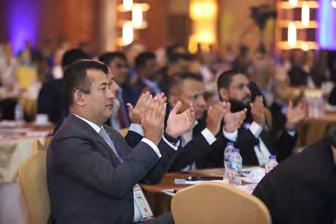
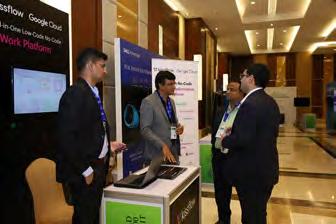
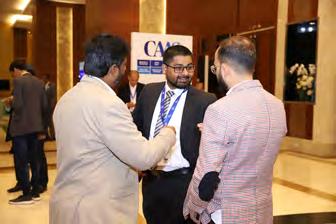
Etihad Cargo, the cargo and logistics arm of Etihad Aviation Group, announced that DSV Global Transport and Logistics has become the carrier’s first partner to purchase sustainable aviation fuel to offset the carbon emissions of its cargo shipment.

Via the book and claim system, Etihad Cargo facilitated
DSV’s SAF purchase, enabling the transport and logistics provider to offset CO2 emissions and reduce non-CO2 climate impact. Etihad Cargo transported DSV’s cargo shipment from Washington Dulles to Abu Dhabi on Etihad’s first transatlantic NetZero flight on 13 November.
Etihad’s Boeing 787 “Greenliner” combined SAF with contrail prevention technology from its partner, SATAVIA, to actively manage carbon emissions and non-CO2 climate effects from contrails, or condensation trails, which cause surface warming and are responsible for up to two-thirds of aviation’s climate impact.
During the three-month trial, Etihad Cargo will share data on fuel burn, load factors and other key variables from flights and cargo shipments and advise on various use cases. IATA and Etihad Cargo will use the world’s first cargo-dedicated CO2 emissions calculation tool to manage and report on sustainability progress to provide the entire value chain, including shippers, forwarders, investors and regulators, with reliable and trustworthy data.
Nissan Motor signed a 200 billion yen syndicated green loan agreement arranged by Mizuho Bank. Nissan will utilise the loan to support its clean mobility and related projects to progress its long-term electrification and carbon neutrality ambitions. The loan contract period will be five and seven years.
As the first funds raised since launching the Nissan Sustainable Finance Framework in July, the company is deepening its investment program in electrification. Loan proceeds will fund eligible green projects defined in the framework, such as R&D, investments and expenditures for the design, development, and manufacturing of zero-emission vehicles and components for electric vehicles or other future carbon- neutral initiatives.
With a second-party review conducted by Sustainalytics, Nissan has aligned its framework with the Green Bond Principle 2021, Social Bond Principle 2021, Sustainability Bond Guideline

2021, Green Loan Principle 2021, and Social Loan Principle 2021.
As a pioneer in electric vehicles, Nissan is accelerating electrification and technological innovation to enhance zero emission and clean mobility. Nissan seeks to empower journeys and society with a range of electrified vehicles of high value to customers.
Admiral Mobility, a company in providing accessible eMobility and energy management solutions, announced the commitment to bring 5,000 electric commercial vehicles to the Middle East. The commitment comprises of 3000 Electric

Commercial Trucks, split between 6T and 8T, and a further 2000 Electric Farizon SuperVANs. The order is the result of a strategic partnership between Admiral Mobility and Geely Farizon Commercial Group, which has been coined as a result
of the growing demand for ecological transportation, be it for highways, the city or backroads, to ensure a cleaner environment for us all.
Supporting governments, municipalities and ‘mega-projects’ in its quest to ‘decarbonise’ the transportation industry, Admiral Mobility’s focus will be to offer businesses distributing goods the opportunity to do this sustainably via the use of EV, electric vehicle trucks, thus providing an environmentallyfriendly and commercially viable business model.

Furthermore, Admiral Mobility will provide multiple ways to support public and private sector businesses, through assisting with charging network requirements, managing after-sales services, as well as offering attractive leasing model arrangements to provide complete flexibility and peace of mind.
‘Better Travel and Tourism, Better World’ a new report developed through a partnership between the Saudi-based Sustainable Tourism Global Centre, STGC with Systemiq, the world’s leading independent system change advisory firm, finds that The Travel and Tourism industry could reduce its emissions by more than 40% by 2030 by taking radical action to contribute to the race to net-zero.
The global Travel and Tourism industry creates opportunities for societies around the world, the economy and nature. However, the analysis of the report showed that the industry today is generating significant environmental and social costs and is responsible for 9-12% of total global greenhouse gas emissions.
The report found that without significant change these emissions will rise 20% by 2030, representing one-third of the total, net zero global
carbon budget of that year. This puts the viability of the industry itself at risk. The Travel and Tourism industry has a vital role to play in slowing down climate change, restoring nature and strengthening communities.
This landmark report is the first to estimate a fully costed strategy for shifting the Travel and Tourism
industry to a net-positive model by 2050. It calls on industry leaders and policymakers to move urgently to implement a reform agenda centred around five priorities: reduce emissions, protect and restore nature, strengthen communities, shift traveller behaviours and increase resilience to climate change and other shocks.
SE Ventures announced a €500 million Fund II establishing the firm as one of the largest VCs focusing on climate and industrial technology. Backed by Schneider Electric, the global leader in the digitalisation of industrial automation and energy management, this
move builds upon a 2018 Fund I to bring SE Ventures to €1 billion of committed capital.
Fund II will begin deployment in January 2023, doubling down on SE Ventures’ track record of success as an accelerant for category-defining companies in climatetech, industrial AI, mobility, prop- tech and cybersecurity.
SE Ventures has created a track record of successfully accelerating categorydefining companies through a strong and experienced team of investors and operators, who have a deep network of founders, VCs and industry experts. SE Ventures is led by Amit Chaturvedy, Global Head and Managing Partner, along with General Partners, Grant Allen and Varun Jain – a senior team of seasoned professionals with collective investing experience of 40+ years across startups and corporate business development – and supported by a growing team of investment professionals and globally based Operating Partners who are focused on portfolio business development.
Saudi Arabia can become a solar energy “superpower” that drives a global sustainability revolution and accelerates the world’s renewable energy transition. Jeffrey Sachs, Director of the Center for Sustainable Development at Columbia University, highlighted the region’s potential to lead a concerted push toward net-zero emissions during the 22nd World Tourism

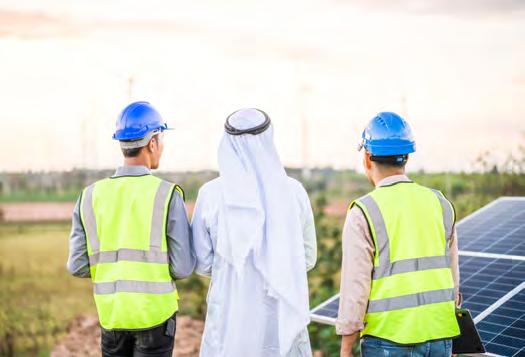
and Travel Council Global Summit in Riyadh.
The 22nd WTTC Global Summit was the biggestever meeting of global tourism and travel leaders, attracting nearly 3000 delegates, 55 government ministers, 60 ambassadors and diplomats, more than 250 CEOS and, former presidents, heads of state and other dignitaries.
Saudi Arabia can become a solar energy superpower driving the global sustainability revolution
Al Masaood Power Division, a part of the Al Masaood Group – one of Abu Dhabi’s leading business conglomerates, has provided sustainable power solutions to its partner Khazna Data Centres, the largest hyperscale data centre provider in the MENA region, using an eco-friendly power generator set – Rolls-Royce solution Series 4000. This 2000, 2200-KW diesel generator set
is designed to switch to a range of sustainable fuels, including hydrotreated vegetable oil or synthetic fuels such as gas-toliquid in accordance with the EN15940 standard.
The mtu A Rolls-Royce solution Series 4000 generator, is primarily diesel based completed with many customisable options, including to use sustainable fuels such as HVO, offering better
storage and lower emissions. It has the capacity to reduce CO2 emissions by 90 per cent, particulate emissions by 80 per cent and nitrogen oxide emissions by 8 per cent.
Next year, the generator will be available with on-demand conversion kits to enable gas engines already installed in the field to run on 100 per cent hydrogen. Due to the combination of key technologies such as turbocharging, exhaust gas aftertreatment and common rail injection, mtu A RollsRoyce solution Series 4000 engines are among the most advanced propulsion technologies available in the market.
Al Masaood Power Division over the last four years has been one of the main suppliers of generators for Khazna Data Centre, which has a large network of generators to provide back-up power to its data centre in the UAE.
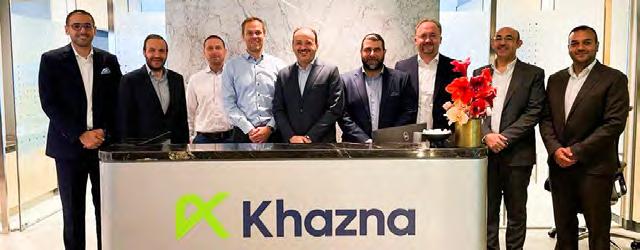
Aspen, a global vendor in industrial software, announced a partnership with Aramco, that positions AspenTech to introduce a unique, integrated modelling and optimisation solution that will enable capital intensive industries to achieve practical and economic solutions for Carbon Capture and Utilisation. The new solution is based on technology developed by Aramco collaboratively with the Korea Advanced Institute of Science and Technology. Aramco, through its subsidiary Saudi Aramco Technologies Company has licensed the technology to AspenTech as part of its broader capabilities to optimise carbon emissions reduction.
It will aim to address the identification of the most promising carbon capture and utilisation paths by simultaneously considering economics, process design and operations constraints and CO2 reduction. The goal of this innovation is to enable businesses to make evidence-based decisions in support of adopting carbon management strategies that optimise and accelerate sustainable operations.
The objectives of the solution will be to allow companies to:
l Optimise CCU configurations to determine the optimum balance between emissions and profitability objectives
l Evaluate the impact of
Dr Vikas Dhole, General Manager, Sustainability at Aspen Technology.
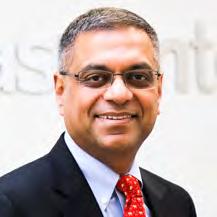
uncertainty in energy costs, carbon fees, and raw material and product costs
l Develop short, intermediate, and long-range production and strategic plans that include consideration for optimum CCU options to simultaneously address profitability and sustainability objectives
ENGIE, the global low-carbon energy company, participated in the largest-ever auction of carbon credits held during the future investment initiative FII, which was organised by the Regional Voluntary Carbon Market
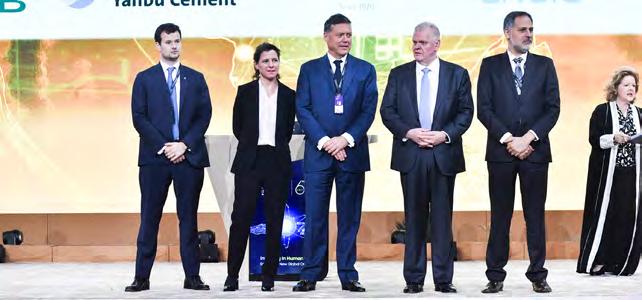
Company. ENGIE GEMS entity traded a total of 483,100 carbon credits to Regional Voluntary Carbon Market Company for the auction. This was the largest single contribution to the 1.4 million carbon credits that were
sold in the largest-ever auction of its kind.
A mechanism designed to reduce greenhouse gas emissions; carbon credits are produced by developers who create carbonreducing projects. Each carbon credit is CORSIA-compliant and Verra-registered. A single credit represents one ton of carbon dioxide that can make up for industrial production, delivery vehicles, or travel emissions. The 483,100 credits provided represent a reduction of 483,100 tons of carbon from the atmosphere
In total, 15 Saudi and regional entities took part in the auction, including Aramco, Olayan Financing Company, and Saudi Arabian Mining Company, which purchased the most significant number of carbon credits.

The International Air Transport Association and Travalyst, have joined forces with the aim of providing consumers with a consistent, accurate and widely available calculation of their carbon footprint from air travel. As all sectors of the aviation and travel industries come together in pursuit of net zero CO2 goals, this new and
major collaboration effort will bring even greater transparency, accuracy and consistency to how a traveller’s carbon footprint is calculated.
Travalyst and IATA both possess a deep understanding of the traveller as well as relevant technical and operational expertise, which will enable the two organisations
to collaborate closely to align CO2 emission calculations. This collaboration will focus on both data and standard methodology for route-based passenger CO2 emissions calculations for aviation at scale. This will include a shared position on how to account for sustainable aviation fuel.



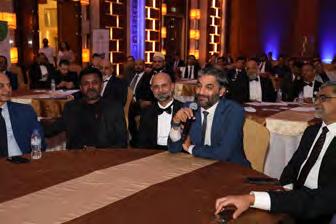
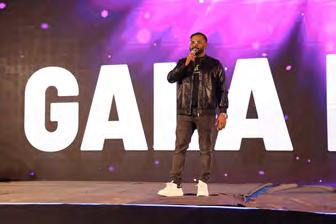

One of the action points highlights the need for global transformation to low-carbon economy through digitisation.
BY ARUN SHANKARThe United Nations Climate Change Conference COP27 that took place in November 2022, ended with a breakthrough agreement to provide loss and damage funding for vulnerable countries hit hard by climate disasters.
Set against a difficult geopolitical backdrop, COP27 resulted in countries delivering a package of decisions that reaffirmed their commitment to limit global temperature rise to 1.5 degrees Celsius above preindustrial levels.
The package also strengthened action by countries to cut greenhouse gas emissions and adapt to the impacts of climate change, as well as boosting the
support of finance, technology and capacity building needed by developing countries.
COP27 brought together more than 45,000 participants to share ideas, solutions, and build partnerships and coalitions.
Says Amish Sabharwal, Executive Vice President, Engineering Business Unit, AVEVA, onsite during COP 27, “I feel there is definitely lot of awareness, specifically around the impact climate change has on the African continent, as well as the funding gaps as Africa has to battle the climate change that is happening in their region.”
Sabharwal feels that forums like the COP 27 are an opportunity to get together, learn, educate, and
collaborate amongst each other. “The first area is perception and the second is getting on the same footing.”
One of the action points at COP 27, known as the cover decision, highlights the need for global transformation to a low-carbon economy.
A digital approach is critical to success in tackling climate change and the energy transition. Data-led technologies are essential to decarbonisation, driving responsible use of the world’s resources and delivering innovative, climate-forward products in the net-zero economy.
To meet the UN Sustainable Development Goals, industry emissions must drop 1.2% each year to put us on net-zero pathways by 2030 and to do this, industries need to take a datacentric approach.

Sabharwal has an overview to sustainability. “If I look at the sustainability equation, there is really three major elements to becoming more sustainable,” he says. And the AVEVA approach to sustainability looks at these three factors.
The first is the supply side of energy which includes the move away from fossil fuels towards renewables, and the parallel process of carbon sequestration. The second is the demand for energy which has to move towards electricity and away from fossil fuels. And the third is the efficiency around energy production, which is linked to digitisation.
“So, sustainability equals, demand plus supply plus energy efficiency. And, that is the equation that I think about,” says Sabharwal.
For AVEVA and other business
and digital transformation technology vendors, the biggest opportunity lies in improvement of energy efficiency through the application of digitisation. This means how assets can use less energy and the transition from fossil fuels to electricity.
“We are trying to provide thought leadership around the role of digitalisation to improve energy efficiency. That is our goal here,” explains Sabharwal about AVEVA’s primary initiatives at COP 27.
A key solution available from AVEVA for usage in large scale enterprises such an oil and gas companies, solar and green energy plants, waste recycling, desalination, and other carbon cyclic plants is the AVEVA operations control application and data dashboard. This facilitates an information dashboard for integration and consolidation of all
The Sharm el-Sheikh Implementation Plan, highlights that a global transformation to a low-carbon economy require investments of at least $4-6 trillion a year
process data, amongst other benefits.
The data tracked in oil and gas plants is linked to the nature of the hydrocarbon in these plants. As the hydrocarbon structure changes, the nature of the fuel component also changes, from unrefined oil, to gas, and to fuel. Since carbon-di-oxide or CO2 is also a carbon molecule, this can also be tracked.
Adds Sabharwal, “At the end of the day, those operating centres are tracking hydrocarbon molecules. They are tracking those molecules turning into chemicals, and chemicals turning into specialty materials. That is what that dashboard is all about. So, there is no reason why you cannot track carbon.”
The ability to look at the carbon molecule, as it is across
AMISH SABHARWAL Executive Vice President, Engineering Business Unit, AVEVA.
We are glimpsing the dawn of our net zero world, and the technology exists to take us there. UK has cut carbon emissions by 47% since 1990 and the lights are still on. 80% of the technologies we need to reach net zero are already with us, we just need to implement them.
AVEVA is committed to creating software that enables companies to harness the power of data to drive down emissions while driving up efficiency. AVEVA is working with more than 20,000 companies in 100 countries to begin that process.
l If we implement the commitments made in Glasgow, we can correct the world to a 1.8-degree pathway by 2050. But there is a long way to go to comply with those commitments, and 1.5 degrees remains the stated target, far from the trajectory the world is currently on.
l We currently do not have an agreed pathway to get there. Mitigation, as well as adaptation, is now a global necessity
l The mitigation approach might be misunderstood as despair in the face of accelerating change, but that is far from the truth. The momentum for climate action has never been stronger.
l Particularly encouraging is the response of the private sector, where massive investment and new technologies are paving the way for transformative public private partnerships for emissions reductions.
l Africa, blessed with 30% of global resources and just 4% of global emissions, is a stark reminder that those who are emitting the most are rarely those most affected by the changes.

l In Nava Raipur, PCMC and Kohima in India, a quarter of water leakage was eliminated and emissions cut by 12-18% by taking a data-centric approach to traffic management and water conservation.
l The massive Sener Noor thermos-solar complex comprising 2 million mirrors focusing the sun’s heat is providing energy for 20%+ of Morocco’s population.
l The world is in a critical decade for climate action.
l Sustainability equals, demand plus supply plus energy efficiency.

l A key point of debate during COP27 was public-private partnership.
l Forums like COP 27 are an opportunity to get together, learn, educate, and collaborate amongst each other.
l A digital approach is critical to success in tackling climate change and the energy transition.
l Data-led technologies are essential to decarbonisation, driving responsible use of the world’s resources and delivering climate-forward products.
l The data tracked in oil and gas plants is linked to the nature of the hydrocarbon in these plants.
l A fundamental change required for financial institutions is to move away from NPV and focus on the future of the planet.
l Implementation of current pledges by national governments puts the world on track for a 2.5°C warmer world by the end of the century.
l The UN’s Intergovernmental Panel on Climate Change indicates that greenhouse gas emissions must decline 45% by 2030 to limit global warming to 1.5°C.
the whole supply chain is a huge opportunity for both enterprises and AVEVA. Carbon tracking is now another dashboard and included in the latest version of AVEVA’s Unified Operations Centre.
AVEVA Operations Control is a suite of products that can be bought on a subscription model. AVEVA Unified Operations Centre is a solution used by UAE oil major ADNOC and various smart city operational centres.
In order to boost digitalisation of the energy industry, AVEVA also partners with vendors, including Microsoft. “The discussion with Microsoft has been around, how do we create an industrial data platform with which the ecosystem, whether it is in capital, build or in operations, can collaborate and share ideas,” says Sabharwal.
Wherever the innovation starts from, inside the energy industry it will finally rest with engineers on how to build a more sustainable plant, as well as how to reduce emissions in existing facilities. “The role for AVEVA and Microsoft is creating that industrial data platform,” adds Sabharwal.
Specifically, the role for Microsoft is to build the technology infrastructure, while AVEVA’s role is to understand the industrial data better, to help engineers build better facilities and operate them more efficiently.
Other than AVEVA and Microsoft, global partners like Accenture and Schneider Electric will help to execute, integrate and build out the applications for industrial enterprises.
Digital technologies are already implemented in Africa and are
driving innovation to close the gap on climate change to support sustainable development.
Governments including Morocco, Egypt and other parts of Africa, are investing in developing digital infrastructure, supported by digital skills. This will ensure people can harness the power of digital to drive deeper efficiency and sustainability gains, through enabling the transition to renewable energy resources or driving down emissions from existing operations.
Africa is a vast source of natural gas and also for generating hydrogen through renewable power sources. “Africa has a huge opportunity to bypass fossil fuel power generation and go directly to renewables like hydrogen for example,” says Sabharwal.
In Morocco, the Noor Concentrated Solar Power Station uses around two million mirrors to turn sunlight into clean energy to supply around 6% of the entire country’s needs, while accelerating the country’s bid for a 52% renewable energy mix by 2030. The project was built using Schneider Electric’s EcoStruxure Plant solution and AVEVA software.
The Noor complex uses a single control platform that integrates a digital automated industrial control system with the solar field, calibration and data collection systems. Data is captured, and predictive asset analytics are applied and performance and profitability are optimised.
Better working and maintenance conditions through remote supervision are also supported, while maintenance and adjustments can be done without stopping energy production, reducing downtime.
The solar facility is completely run by AVEVA’s Unified Operations Center that manages
the inclination of the solar panels using millions of data points, says Sabharwal.
Including Morocco’s Noor solar energy complex, solar energy capacity in Africa is at less than 1% of its potential. The target is to reach 30% by 2050. To reach there, Africa will require $190 billion in investment each year between 2026 and 2030, according to the International Energy Agency.
For Namibia Breweries Limited, AVEVA Historian supports the management of energy consumption, reduces CO2 emissions, and improves production. The renewable energy system supported with AVEVA Historian provides for 8% of the company’s electricity demand as well as approximately 4.23 million kWh of green energy. NBL has achieved a savings of 4,230 tons of carbon dioxide. Precise verification of KPIs can now be obtained to evaluate plant processes and related equipment operations.
In South Africa, Astron Energy
has boosted operational efficiency by 20% by unifying data across their operations, empowering their teams to make better decisions.
Using AVEVA Connect, the company transformed its crude management processes without disruption to the business and reduced assay creation time by 50%.
Black Rock Mining Operations improved energy efficiency, optimisation and increased transparency and safety by bringing together data from across its separate locations in South Africa into one control centre. Productivity has grown by 10% and mines across their network are now sharing best practices efficiently.
In West Africa, liquefied natural gas producer Nigeria LNG uses digital twin software supported by AVEVA Unified Operations Center, AVEVA Information Management and AVEVA Predictive Analytics.
On at least two occasions, it has provided intervention and corrective support, preventing unplanned downtimes and potential revenue

loss. It also has transformation potential to optimise production, improve productivity, assure asset integrity, and ensure health, safety and environment protections.
Pan-African agribusiness Illovo Sugar sweetened its production process by using AVEVA PI System. The software helps it create a real-time reporting system to track the performance of 49 packing machines across five sites in three countries. Measurable results included a 50% improvement in performance, a 25% improvement in availability and 30% improvements in overall equipment effectiveness in three months.
These implementations show how African business is being transformed by data-led digital technologies. When people across industrial ecosystems are connected along a single digital thread, value chains can be transformed into agile, profitable, sustainable networks. This is because all parties along the chain have realtime access to exactly the same data –empowering new and connected industrial networks both within companies and with trusted external partners.
Connecting and sharing data along a single digital thread can unlock sustainable growth across the entire ecosystem. The rise of this is what AVEVA calls connected industrial economy.
A key point of debate during COP27 was public-private partnership. The cover decision, known as the Sharm elSheikh Implementation Plan, highlights that a global transformation to a lowcarbon economy is expected to require investments of at least $4-6 trillion a year.
Delivering such funding will require a swift and comprehensive transformation of the financial system and its structures and processes, engaging governments, central banks, commercial banks, institutional investors and other financial actors.
A fundamental change required for financial institutions is to move away from NPV and focus on the future of the planet.
While there have been lots of success in
controlling carbon emission, they are very small compared to the rapid rise in postpandemic CO2 levels. “I think they are very ambitious targets already. There has got to be some drastic changes to those metrics,” feels Sabharwal.
In the closing plenary it was pointed out, that the world is in a critical decade for climate action. Implementation of current pledges by national governments puts the world on track for a 2.5°C warmer world by the end of the century. The UN’s Intergovernmental Panel on Climate Change indicates that greenhouse gas emissions must decline 45% by 2030 to limit global warming to 1.5°C.
“The public side has a big job to do, to set policy as well as targets, that they want to abide by,” emphasises Sabharwal.
The net worth of the global private sector including AVEVA customers in energy, power, mining is more than $200 trillion. The CO27 finding indicates that investment level for transformation of the carbon producing economy is in the range of $4-6 trillion per year. Hence the challenge to tackle climate is neither the investment required nor the technology. Both exist today and in sufficient levels to make a difference.
“The big question is why are not we not spending it to solve this problem?” asks Sabharwal.
According to Jean-Pascal Tricoire, Chairman and Chief Executive Officer of Schneider Electric, 70% of the carbon can be abated by existing technologies.
In public forums Schneider’s Tricoire has said, the primary driver of climate change is carbon emissions, and 80% of carbon emissions are energy related. To confront this climate crisis, we must reduce these emissions drastically. In fact, we must halve our carbon footprint in the next 20 years. This demands that we fundamentally change how we produce and consume energy.
To summarise, the technology to make a difference exists today. The main question is what is preventing us from implementing these changes. Sabharwal indicates this is where the public sector has to take the lead. “Put the regulations and policies in place, and the private sector has to pay for it.” n
Africa is a vast source of natural gas and also for generating hydrogen through renewable power sources
Sharm el-Sheikh Implementation Plan requires a global transformation to a low-carbon economy requires with investments of $4-6 trillion a year.
The United Nations Climate Change Conference COP27 ended with a breakthrough agreement to provide loss and damage funding for vulnerable countries hit hard by climate disasters.
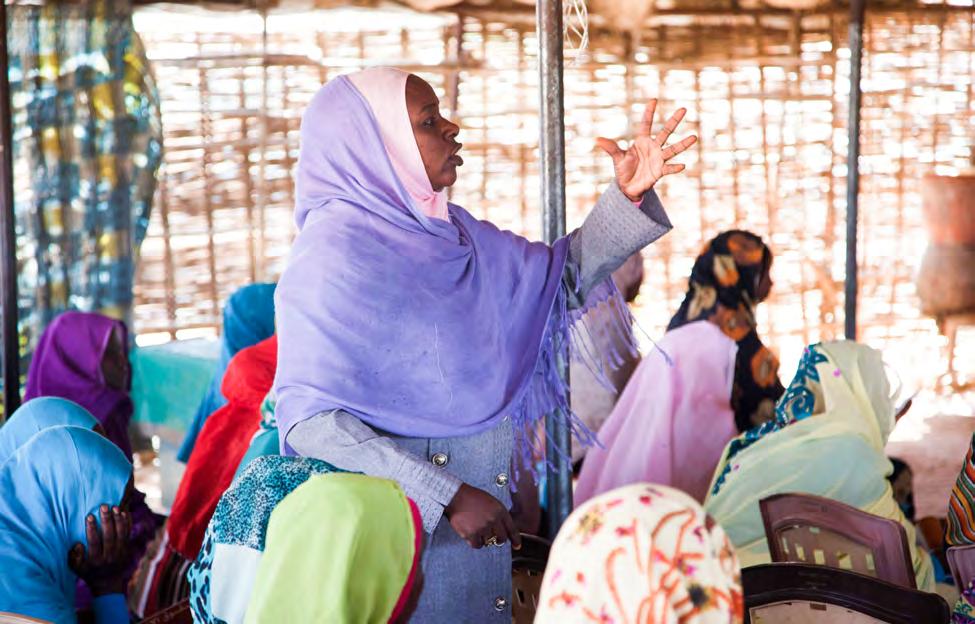
Set against a difficult geopolitical backdrop, COP27 resulted in countries delivering a package of decisions that reaffirmed their commitment to limit global temperature rise to 1.5 degrees Celsius above pre-industrial levels.
The package also strengthened action by countries to cut greenhouse gas emissions and adapt to the impacts of climate change, as well as boosting the support of finance, technology and
capacity building needed by developing countries. COP27 brought together more than 45,000 participants to share ideas, solutions, and build partnerships and coalitions. Indigenous peoples, local communities, cities and civil society, including youth and children, showcased how they are addressing climate change and shared how it impacts their lives.
In the closing plenary it was pointed out, that the world is in a critical decade for climate action.
Implementation of current pledges by national governments put the world on track for a 2.5°C
warmer world by the end of the century. The UN’s Intergovernmental Panel on Climate Change indicates that greenhouse gas emissions must decline 45% by 2030 to limit global warming to 1.5°C.
The cover decision, known as the Sharm elSheikh Implementation Plan, highlights that a
global transformation to a low-carbon economy is expected to require investments of at least $4-6 trillion a year. Delivering such funding will require a swift and comprehensive transformation of the financial system and its structures and processes, engaging governments, central banks, commercial banks, institutional investors and other financial actors.
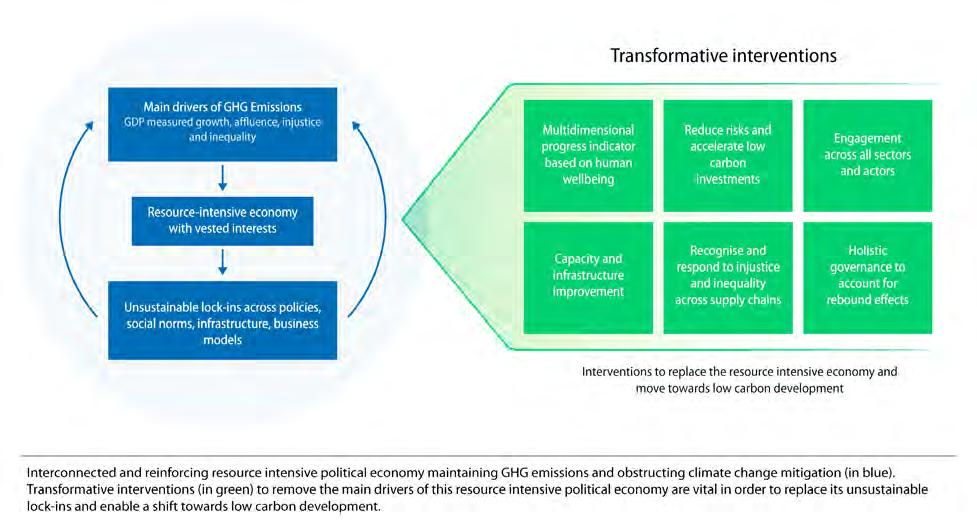
The global energy crisis underlines the urgency
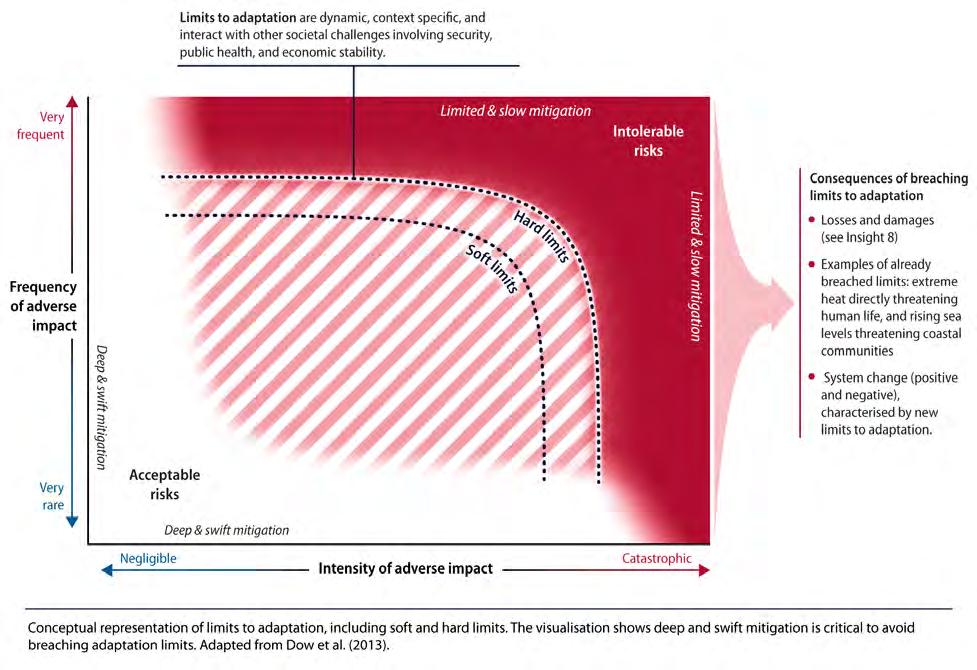
to rapidly transform energy systems to be more secure, reliable, and resilient, by accelerating clean and just transitions to renewable energy during this critical decade of action.
Governments took the ground-breaking decision to establish new funding arrangements, as well as a dedicated fund, to assist developing countries in responding to loss and damage. Governments also agreed to establish a transitional committee to make recommendations on how to operationalise both the new funding arrangements and the fund at COP28 next year.
Parties also agreed on the institutional arrangements to operationalise the Santiago Network for Loss and Damage, to catalyse technical assistance to developing countries that are particularly vulnerable to the adverse effects of climate change.
COP27 saw significant progress on adaptation, with governments agreeing on the way to move forward on the Global Goal on Adaptation, which will conclude at COP28 and inform the first Global Stocktake, improving resilience amongst the most vulnerable. New pledges, totalling more than $230 million, were made to the Adaptation Fund at COP27.
UN Climate Change’s Standing Committee on Finance was requested to prepare a report on doubling adaptation finance for consideration at COP28 next year. n
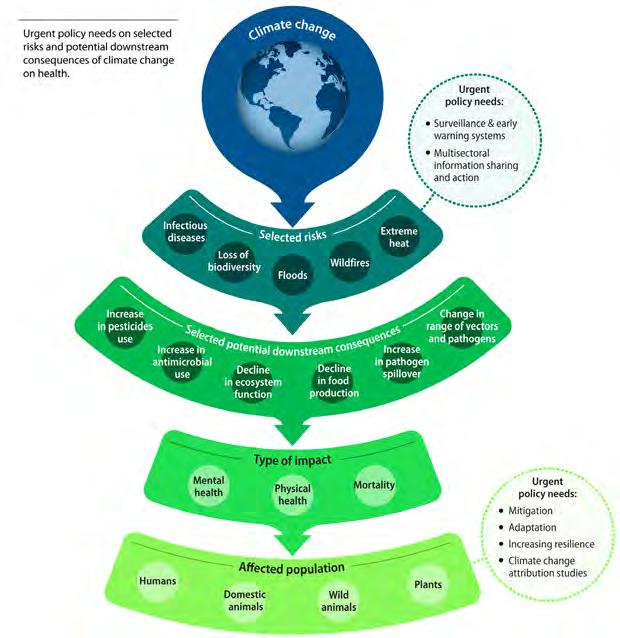
• COP27 saw the launch of a new five-year work program at COP27 to promote climate technology solutions in developing countries.
•
• A mitigation work programme was launched in Sharm el-Sheikh, aimed at urgently scaling up mitigation ambition and implementation.
•
• The work programme will start immediately following COP27 and continue until 2026 when there will be a review to consider its extension.
•
• Governments were requested to revisit and strengthen the 2030 targets in their national climate plans by the end of 2023.
•
• Accelerate efforts to phasedown unabated coal power and phase-out inefficient fossil fuel subsidies.
•
• UN Secretary-General António Guterres announced a $3.1 billion plan to ensure everyone on the planet is protected by early warning systems within the next five years.
•
• The UN Secretary-General’s High-Level Expert Group on Net-Zero Commitments published a report at COP27, serving as a how-to guide to ensure credible, accountable net-zero pledges by industry, financial institutions, cities and regions.
•
• The G7 and the V20 launched the Global Shield against Climate Risks, with new commitments of over $200 million as initial funding. Implementation is to start immediately.

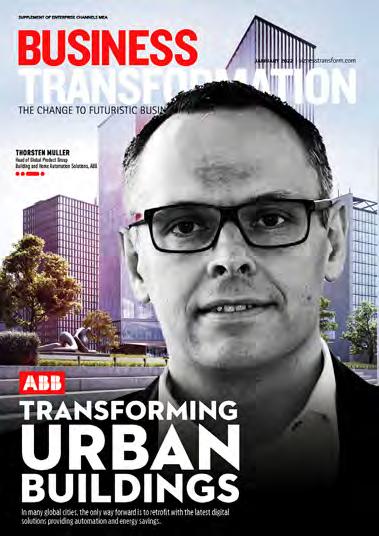
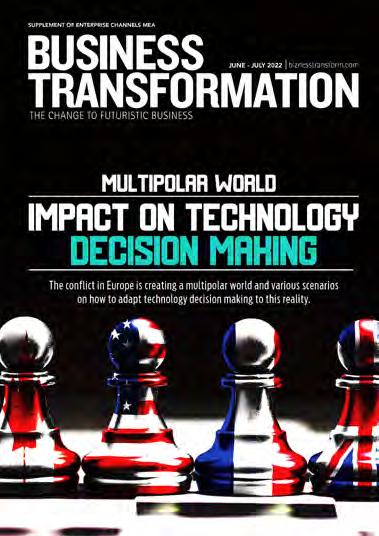
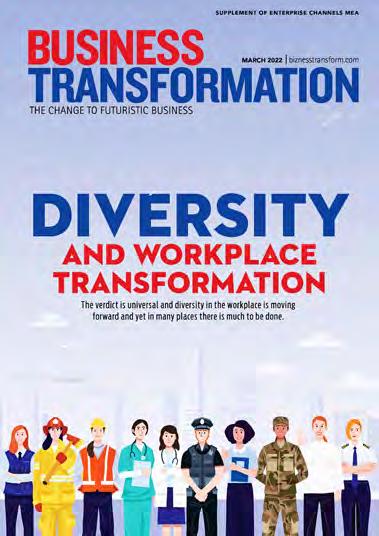
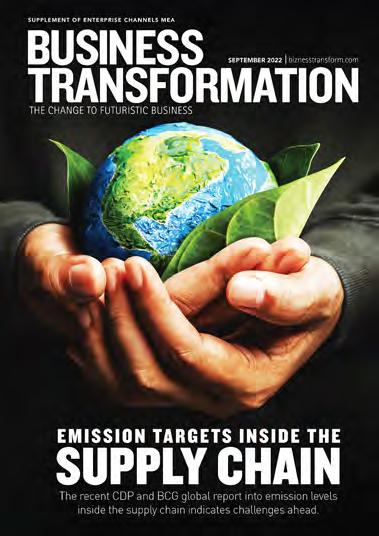
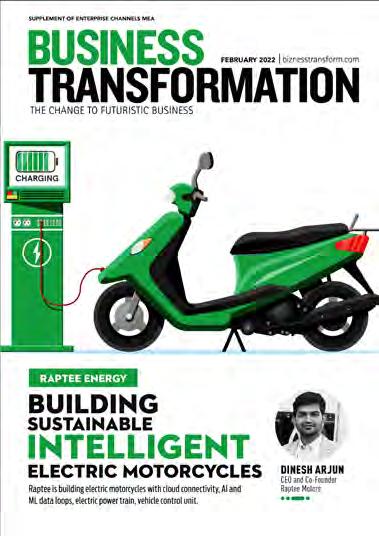
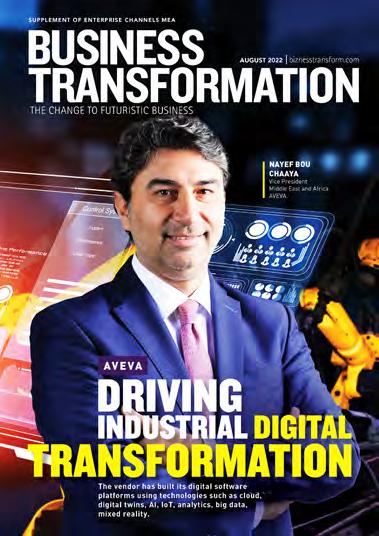







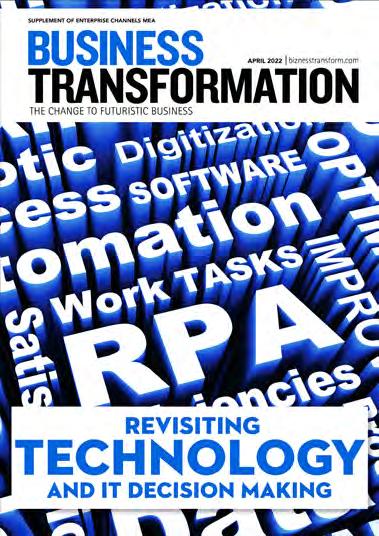


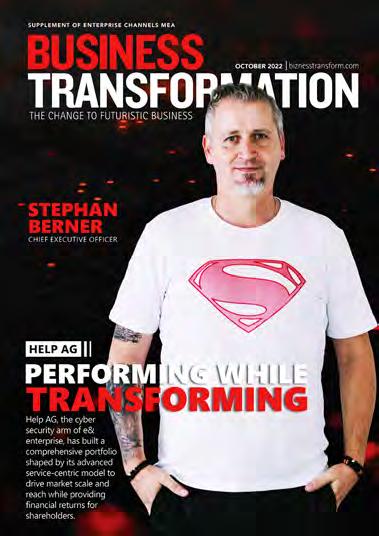
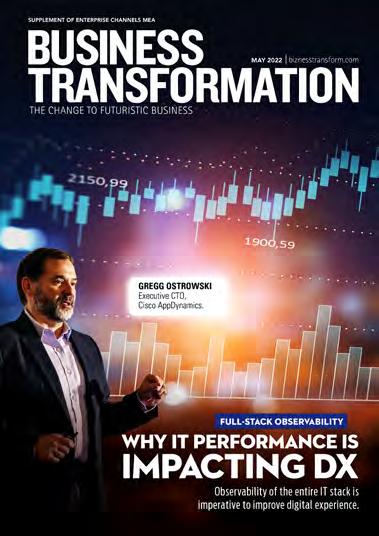
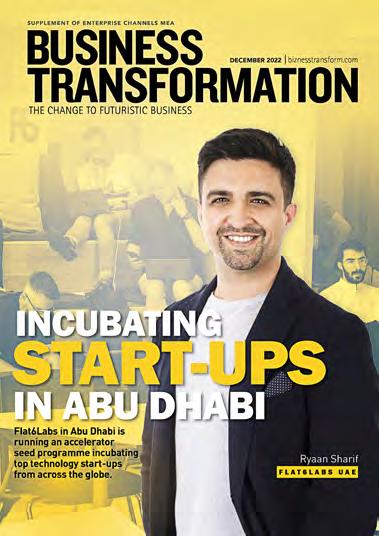
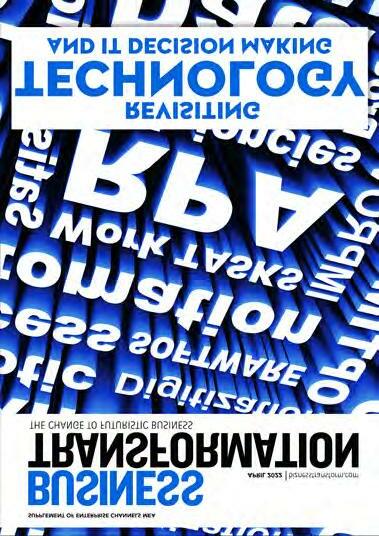



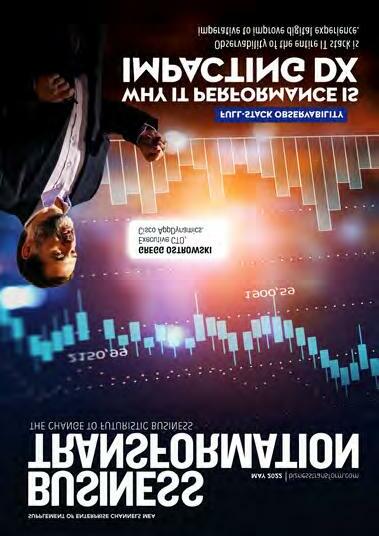


Top executives share their thoughts on the business transformation and sustainability road map ahead.
Company resilience in 2023 will be determined by two main factors: using advanced analytics and AI-orchestration to reshape employee and customer experience.
The days when a one-size-fitsall customer experience could help a business succeed in the marketplace are over. Customers believe that a firm is only as excellent as its service as their product offerings.
be a good investment, not only for CX, but also for staff engagement and the whole employee experience.
Director2022 was filled with both highs and lows. From rising consumer and employee expectations to the promise of a new normal following a pandemic to a worsening economy, the year 2022 has presented everyone with anticipated and unanticipated obstacles. As a result, companies will emphasize and continue to invest in digital transformation in 2023. Rising operational expenses will fuel the expansion of artificial intelligence AI and digital automation for employee and consumer satisfaction.
As consumer expectations and demands increase, organisations will attempt to orchestrate experiences with greater consistency. However, realising the importance of empowering employees in the current business scenario, organisations will also place employee experience at the centre of CX strategy and corporate objectives.
AI will enhance the coordination of customer journeys, leading to a culture shift toward empathy. Using advanced, AIdriven systems of listening, understanding, predicting, acting, and learning, businesses will choreograph customer journeys across marketing, sales, and service to create unified, empathetic experiences at scale.

In addition, businesses will move toward cloud platforms that enable real-time assembly and orchestration of individual customer and employee experience capabilities across four major building blocks: product, marketplace, ecosystem, and development, in order to keep up with the rapid pace of change and use CX for competitive differentiation.
Success in the experience economy necessitates a peoplecentric and agile approach to technology that takes into account both customers and employees.
To engage modern teams, it is time for a new perspective on employee experience. In 2023, an increasing number of businesses will understand that enhancing their agent labour force with the appropriate AI technologies and digital automation will prove to
Instead of merely automating more service contacts, businesses will employ AI to improve the human elements of both selfservice and agent-assisted experiences. This will enable them to provide enhanced customer happiness, agent empowerment, and a positive return on investment.
Overall, company resilience in 2023 will be determined by two main factors: using advanced analytics and AIpowered orchestration to reshape the employee and customer experience and leveraging transformative technology to deliver unprecedented simplicity, efficiency, and agility, and this cannot happen without the power of Cloud computing and the reinvention of traditional IT structures.
Organisations in the Middle East are reinventing customer experiences by adopting Cloud technologies to be competitive and agile for their customer offerings, and Genesys is committed to becoming a partner in their digital transformation initiatives. Cloud born platforms bring flexibility and modernisation to digital infrastructures and allow businesses to create interactive and innovative customer experiences, thereby improving loyalty and enhancing performance. n
HP believes that success lies in embracing three crucial C’s – connection, clarity, collaboration, which are at the heart of the new hybrid working culture.
Hybrid work is here to stay. It is an exciting new world filled with the power and potential to transform business; as every organisation is unique, each will adopt its own approach to hybrid. HP Global Hybrid Working Survey finding have shown that 11% of global workforce are working exclusively from the office, 6% are working exclusively from home and 70% are working a blend of two to four days from the
office, with the remainder from home. This means we must embrace hybrid work as a long-term reality, and we must make it work for all.
The right approach to hybrid work depends on optimising businesses technology, processes, and culture to meet the needs of their workforce. HP believes that success lies in embracing three crucial C’s – Connection, Clarity, and Collaboration - at the heart of the new hybrid working culture.
Managing Director, HP Middle East and Africa.
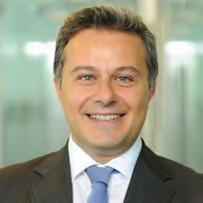
Organisations worldwide continue to encounter sophisticated cyber threats that hold the potential to disrupt business operations. A vast majority of those threats can go undetected, or they are detected too late for an organisation to avoid risk. There will not be an unlimited treasure chest of money to devote to cybersecurity in 2023, so it is important to be intentional about where to invest.
over the last year, we have seen signs of increased development and trading of capabilities in the cybercrime community – from tools to hack BIOS passwords, to rootkits and trojans targeting device BIOS Basic Input/Output System and UEFI Unified Extensible Firmware Interface.

l Right approach to hybrid work depends on optimising technology, processes, culture to meet the needs of the workforce.
l Organisations worldwide continue to encounter sophisticated cyber threats that hold the potential to disrupt business operations.
l Compliance is not the only aspect of good governance; it is about properly managing your company’s resources and budget.
l As attacks against users increase, having security baked into people’s PCs from the hardware up, will be essential.
Compliance is not the only aspect of good governance - it is about properly managing your company’s resources and budget. Knowing which areas expose the company to the most risk will be crucial in understanding the security issues at hand.
With a strong cybersecurity foundation, organisations can ensure maximum resiliency for anything that gets through. It is key that organisations start asking the right questions about how devices are designed with security and resilience in mind down to the hardware and firmware levels. As attacks against users increase, having security baked into people’s PCs from the hardware up – so they can easily prevent, detect and recover from attacks using tools like HP Sure Recover –will be essential.
Threat containment technology like HP Sure Click Enterprise help defend against the most common attacks, the malware can’t infect anything. This way organisations can reduce their attack surface and protect employees without hindering their workflows.
In 2023, organisations should take control of firmware security. Firmware attacks were once only used by sophisticated Advanced Persistent Threat groups and nation states. But
Access to the firmware level enables attackers to gain persistent control and hide below the device Operating System, making them very hard to detect – let alone remove and take back control. Organisations should also understand and evaluate state of the art technology that is available to protect, detect, and recover from such attacks like HP Sure Start, Sure Recover, Sure Admin, or Tamper Lock.
HP recognises the imperative to minimise the technology industry’s environmental footprint and embraces the opportunity to position itself as a business and technology leader enabling a low-carbon economy. HP is applying rigorous sustainable design principles to help compel progress toward reducing carbon emissions, supporting a circular economy, and protecting and restoring forests. HP designs products for energy efficiency and offers convenient, more sustainable service-based solutions. We also use multiple metrics to assess progress and impel improvement.
HP is also reducing greenhouse gas emissions across the value chain including operations, supply chain, and products. HP has adopted a ‘full circle’ approach to our products and services, in which servicebased solutions deliver better value to customers with reduced environmental impact and capital costs. n
What is also a growing trend is higher levels of service innovations with capabilities such as remote monitoring working alongside virtual assistance.
technologies, data generation is increasing tremendously. This increase will see at least 75% of organisations begin to rely heavily on AI and ML to keep pace with digital and business transformation. Organisations rely on AI and ML to extract optimum value from data, enabling accurate insights, predictive analytics, workflow automation, and helping to inform critical business decisions. To support this model, businesses will demand that new solutions include embedded AI and ML capabilities.
business organisations.
It is evident that organisations are primarily looking for efficiencies in all that they do and optimising existing assets. To support this, the focus will continue on leveraging their digital investments data, reporting and resource planning capabilities within all departments of the organisation. In addition, there will be a drive towards measurements based around environmental, social and governance ESG as a longterm business strategy and value creation, with rising stakeholder interest in ESG performance. Needless to say, network and cyber security will continue being a priority.
With continuous developments taking place in infrastructure and the introduction of new
What is also a growing trend since the pandemic is higher levels of service innovations with capabilities such as remote monitoring and diagnostics working alongside remote or virtual assistance. It is important to ensure that service is designed and delivered to have consistent positive customer experiences. Therefore, service-based products and solutions will become a huge focus with a lot of efforts put in during the design and R&D stages.
Larger organisations are leading the way with their ESG strategies however it is evident is that small and medium sized companies will be making very focused efforts to achieve net zero carbon emissions.
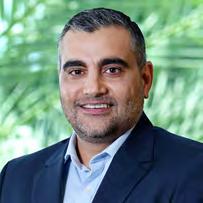
What will also transpire is that larger organisations will support smaller companies by sharing sustainability strategies and data-based insights. And together there will be a joint effort to speed up the rate ESG efforts across
Sustainability is key priority for IFS and the company’s goals are closely connected to the customer’s agenda. The company has a multi-pronged strategy to meet customer needs and designed an ESG Application for IFS Cloud which is available inside Microsoft teams. It helps streamline data collection and can demonstrate real-time benefits to the user. IFS aims to put relevant technology into the hands of companies that have chosen to be proactive and innovative in building sustainable business models. Just as in financial performance, companies must take a similar approach to measuring ESG performance.
The latest enhancements of IFS Cloud are designed to help customers accelerate their automation efforts and helps connect them globally across sites, functions, people and assets. It also helps them achieve their ESG goals. This new version allows customers to constantly evolve their solution without the need for major upgrades or migrations and helping them to focus on business transformation.
Data overload comes with its own dangers; however, IFS solutions can help decipher and identify the root cause of malfunctions. The company’s AI and ML solutions provide powerful anomaly detection and pre-empt maintenance programmes that can be initiated and are very effective in the long run. n
Most companies do not need to tackle carbon emissions in a direct manner and there are indirect ways to also tackle carbon emissions.
to get the right resource from the market and enhance experience of employee satisfaction. Digital HR technologies are being adopted to reduce cost, improve performance, and elevate employee experiences. All of which are becoming more important as companies compete for talent.

Tech trends are accelerating the main characteristics of the new digital era which is scale, speed, and granularity of data. The magnitude of these changes is giving birth to new innovations, businesses, and business models.
Accelerated digital transformation is the new objective of top businesses and enterprises. Optimising resilience, scaling productivity and customer value by advance solutions, pioneering customer engagement with accelerated response and giving opportunity, pursuing sustainable technology solutions.
The adoption of tool and technologies have improved employee experience and enhanced operational performance through data driven automated practices.
By the use of technologies, Innovations Group helps business
The emergence of cloud and 5G are examples of increase in computing power and network speeds that enable greater innovations.
In 2023, we will see innovation and development in transformative technologies such as artificial intelligence AI, Internet of things IoT and virtual and augmented reality VR AR, cloud computing, blockchain and superfast network protocols like 5G. This will bring us closer to build an Intelligent Enterprise.
Organisations need to have leaner structures. People need to be given more independence and leadership in their own tasks. Micro management needs to reduce and the level from your junior roles all the way to up to your C-Suit roles should shrink as this will improve feedback, efficiency, even for those who are working remotely.
The levels of hierarchy towards the people will be shorter and thus the amount of supervision, control and growth for the employees will improve if the organisation structure becomes leaner.
Most companies do not need to tackle carbon emissions in a direct
manner. There are indirect ways to also tackle carbon emissions, for example, you do not need to try to reduce the amount of paper you try to consume directly but what you can do is find ways to move your processes online and as a result, reduction in printing and paper will automatically come through this which not only brings more efficiency to your business but naturally reduces carbon emissions. So, the blueprint would be to digitise as many processes as you can.
Usually, the form of digitising these processes would be to take up a thirdparty software, we look at the costs of this third-party software and then identify towards the environment savings that you can bring to your firm and justify the costs through those savings. It will also reduce the number of manhours required to transport from place to place. So, all digitising does indirectly is reduce carbon emissions and rather than thinking about it in a direct way.
Instead of, how do I reduce it, it is better to think of your business processes by asking, how to become more efficient and less dependent on human resources, and find ways to automate and digitise your processes. n
EU’s AI Act could be enforced as early as 2024, while enterprises will soon have IT personnel throughout the organisational chart for business-driven needs.
Since the start of the pandemic, there have been significant changes in how employees interact with IT tools and teams. Across the board, enterprises are seeing more collaboration between nonIT employees and IT personnel, and this collaboration can be, at least in part, attributed to IT decentralisation and democratisation.
In the increasingly digital-first, hybrid work environment, there are five predictions that are likely to come to fruition.
In the current digital-first, hybrid work environment, more employees than ever are deciding for themselves how their technologies will be chosen, deployed, and used, which has led
to an increase in the use of low, no-code solutions. Also, AI models will continue to evolve; scalable platforms will be preferable to individual tools, and enterprises will make some tough hiring decisions in 2023.
In the wake of the Great Resignation, some companies assumed it would be easy to find new talent, but that really has not been the case, especially in regard to software-engineering workers. Factors like diversity and inclusion will continue to influence hiring decisions. Continuing to train, educate, and foster the careers of existing employees is the best course of action. That said, enterprises will have to choose for themselves how best to proceed.
President ManageEngine.
In 2023, there will be AI models with better precision, being built with a limited amount of training data. Techniques like few shots learning and transfer learning will see increased adoption, and the gap between natural language processing and computer vision will continue to blur. As an example, we are already seeing applications that allow us to search through a recording for a particular topic; then, by conversing with a chatbot, we are brought to the relevant timestamps.
AI regulation is also on the horizon. Just like the data privacy legislation, this regulation will come from the European Union. Set to become law in 2023, the EU’s AI Act could start being enforced as early as 2024.
ENTERPRISE-IT WILL EVOLVE INTO ENTERPRISE-WIDE IT
THE TOOL VERSUS PLATFORM DEBATE WILL BE LAID TO REST
Enterprises of varying sizes and maturity have made different choices, especially in regard to the management of their technology infrastructure. Some opted to go with a specialised tool for every problem; others invested in a platform that could expand to solve problems as they arose.
The platform option is far more efficient. Having a tool for every problem doesn’t help enterprises keep pace with changing demands. More and more enterprises will opt for the holistic, scalable platform approach to managing their technology infrastructure.
l In the wake of the Great Resignation, some companies assumed it would be easy to find new talent, but that really has not been the case.
l Continuing to train, educate, foster the careers of existing employees is the best course of action.
l Set to become law in 2023, EU’s AI Act could start being enforced as early as 2024.
l As technological expertise continues to permeate throughout enterprises, nonIT employees will use low, no-code platforms.
l The platform option is far more efficient and having a tool for every problem does not help enterprises.

The decentralisation of IT personnel will continue. Not only will most enterprises have a centralised IT group to handle requirements like systems deployment, cybersecurity, compliance, and threat detection, but these enterprises will also have IT personnel throughout the organisational chart, addressing specialised business-driven needs as they arise.
As technological expertise continues to permeate throughout enterprises, nonIT employees and IT-adjacent service delivery teams will use low, no-code platforms to build and deploy simple applications. According to a recent ManageEngine study - IT at Work: 2022 and Beyond, 42% of global IT decision makers believe that each department will have its own IT team in the next five years.
Organisations will consolidate enterprise services on a unified service management platform, facilitating remote-first employees with a productive workspace—wherever these employees choose to work. In addition to IT knowledge resources commonly accessed from a single enterprise selfservice portal, employees will increasingly be able to access and request services.
For example, the capacity to onboard remote employees, confirm corporate bookings, and submit travel expenses.
The rapid evolution of technology and the changing business landscape has put pressure on businesses to find and retain talent; the question of whether enterprises should find fresh talent or reskill existing employees is one that enterprises will have to make. n
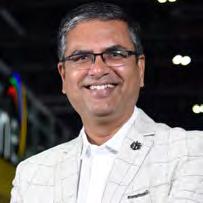
Using low-code to make development faster, reducing repetition and grunt work, and Pareto principle for wastages, enterprises can build motivated teams.
the market’s ever-changing requirements. For these reasons, a high-performing low code platform will play a key role for several businesses and tech executives in 2023 and beyond.
Moving into 2023, business and technology enterprise executives are considering digital transformation to be a key objective in their strategies. They do this in order to remain competitive, add value, and improve productivity and reliability. For example, the UAE has introduced a long-term objective towards modifying public and private sectors through using innovative digital strategies to enhance customer experience and improve business efficiency.
If the past year has taught us anything, it is not just necessary for organisations to meet their digitalisation objectives. They need to fit it in a contracted timeline to enjoy the first-mover advantage and in a capacity that allows scalability and the freedom to introduce new features and services that correspond to
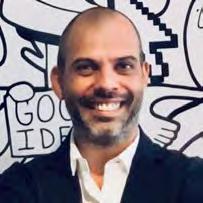
To thrive in the current economy, companies need high-performing dev teams to keep up with the market changes. Companies can build high-performing dev teams by promoting creativity, sharing ownership, and encouraging the team to share ideas freely. Yet always clearly setting the ultimate vision of where we want to be, and defining the success KPIs upfront. Otherwise, you risk people going through perceived great ideas in the wrong direction.
By behaving this way and using low-code to make development faster and easier while reducing repetition and grunt work, they can build a motivated team that will go the extra mile.
As organisations grow conscious of their environmental impact and adopt sustainable practices, technology will be a great enabler to help them achieve their sustainability goals. But first, they need to find out their footprint, where the waste is, identify major impacts, and then implement quick wins.
If they do not understand where most of the waste originates, it will be difficult to plug it. The Pareto principle will be applicable here, where
a majority or 80% of the waste will be the consequence of 20% of their entire process. Once this has been identified, they can utilise technology and human ingenuity to find solutions.
The OutSystems high-performance low-code platform provides the ability to accelerate companies’ digital transformation journey. It is designed to unleash innovation from across an organisation, whether large enterprises or smallto-medium businesses, enabling them to build serious applications that solve their biggest business challenges and respond to market changes and new opportunities using innovative, digital solutions that solve business problems.
OutSystems allows business and technology enterprise executives to develop customised software to meet their specific needs. As a result, this creates tailored software fast that suits the needs of the enterprise and customer accurately. n
The Pareto principle will be applicable here, where 80% of the waste will be the consequence of 20% of processes

Hardware-based acceleration, convergence of interfaces, mass capacity hard drives, heat-assisted magnetic recording, will surface in 2023 and ahead.
In an era when businesses are deluged with data, a lot is going on in the industry to optimise data movement around a system. Data movement can be optimised in two major ways: via data reduction technology and through data awareness methods. While software-based techniques have primarily addressed this issue, hardwarebased technologies are now growing in popularity.
l Companies should be aware of hardware-based acceleration and offload as they increase their storage deployment.
l Convergence of interfaces allows for simplification of solutions as well as expansion of composability use cases.
l Businesses will be able to spend less on connectivity and hardware.
Examples of techniques increasingly being implemented in hardware include encryption, compression, and dedupe. Data awareness tools that have a great deal of momentum going into 2023 are AI- and MLbased methods. Companies should be aware of hardwarebased acceleration and offload as they increase their storage deployment.
Emerging interfaces will continue to reduce complexity of storage systems. CXL and NVMe have gotten a lot of traction in 2022. In 2023 that traction will give way to a more simplified deployment. Increasingly, NVMe over fabric is being used to mesh end devices together. CXL will be key to extending memory as systems continue to become disaggregated.

Convergence of interfaces allows for simplification of solutions as well as expansion of composability use cases. Thanks
Heat-assisted magnetic recording technology will power the latest inflection in mass-capacity devices
to this trend, businesses will be able to spend less on connectivity and hardware.
Heat-assisted magnetic recording technology will power the latest inflection in mass-capacity devices. The HAMR-enabled boost in areal density will help fuel next-generation hard drive development and growth through the next decade.
HAMR technology will enable the first-generation of 30TB+ hard drives, which will ship in 2023. HAMR will enable the new trajectory of capacity growth, providing businesses more room for their data. n

Launched to aid organisations measure emissions using data from devices, identify root causes and contributing factors, while using ML and AI to manage them.
Given the fact that the pandemic is only just behind us while the threat of recession is looming ahead, organisations are expected to be cautious in their human capital investments by elevating and promoting deserving and competent workforce while limiting new hires or team expansions to the bare minimum. The key will lie in being agile in responding to social, political and economic external changes that could shake up a country, region or the entire world.
This can be simply achieved by focusing on core capabilities, core processes with the right organisational support while relying on thirdparty support in areas that are not strategic or where suitable and cost-effective, to not increase head count that leads to additional overheads. Adhering to these cautionary measures will keep the company resilient in 2023.
Businesses have faced huge challenges and have undergone incredible amount of change over the past few years. While in 2023, businesses will have to deal with the aftereffects of the pandemic,
the year will continue to witness innovations and developments for businesses to optimise and consolidate to create smarter enterprises through business and technology transformations.
Moreover, given the political changes and global economic outlook, ongoing inflation and subdued economic growth, companies need to continue elevating their resilience and future proofing to stay afloat as they constantly look to gain cost and business efficiencies for the long-term.
As businesses continue to accelerate digital transformation and technologies such as AI, IoT, cloud, blockchain, will see continued adoption and boundaries blurring. The focus of transformation in 2023 will lie on technologies that will support optimisation and sustainability objectives and strengthen existing organisational capabilities. For this, businesses will need to ensure the right technologies are adopted throughout processes in every area of operations across the business.
Speaking of sustainability, as the world is increasingly waking up to the fact that climate disaster will pose a huge challenge, companies
Director Transformation Solutions, Middle East and Turkey, Software AG.
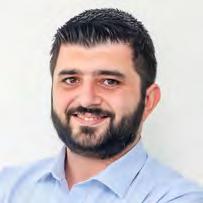
will have to ensure creating sustainable business models by integrating systems seamlessly and running processes efficiently to facilitate free flow of information and insights to drive transformational growth. Solutions that will see significant growth, amongst others are, solutions around security, data governance and the adoption of agile and scalable integration with increasing cloud adoption for optimum impact on IT and business operations and the overall infrastructure of a business.
Additionally, integration solutions software webMethods from Software AG aids organisations in merging duplicate processes using analytics thereby making the organisation overall efficient.
l Focusing on core capabilities and core processes while relying on third-party support in areas that are not strategic.
l Adhering to these cautionary measures will keep the company resilient in 2023.
l Businesses have faced huge challenges and have undergone incredible amount of change over the past few years,

l Companies will have to create sustainable business models by integrating systems seamlessly and running processes efficiently.
In present times, most enterprises are becoming aware that carbon emissions are not a result of certain activities or some processes of an organisation alone. For instance, it is no longer limited to manufacturing companies which were known to contribute to carbon emissions directly. Executive travel, for instance is becoming one of the big contributors to this and organisations are consciously reducing employee travel thereby consciously contributing towards building a sustainable future.
Having said, a thorough evaluation of organisation wide processes is important to consolidate and optimise processes that help in monitoring carbon emissions.
ARIS for Sustainability from Software AG was launched earlier in 2022 to aid organisations to monitor and measure emissions using data from devices across the board that identify root causes and contributing factors using ML and AI and recommend ways to best manage them; either alter or eliminate those areas from the business to make them more sustainable.
ARIS from Software AG supports business process analysis and management, enables organisations to embrace digital transformation, helping them identify and improve business inefficiencies and is the key to operational excellence. Its process mining capabilities allows businesses to identify bottlenecks and opportunities and execute processes in a more efficient manner while also enabling a comparison between identified as-is situations and to-be standards to drive process standardisation.
On the other side, the company’s Enterprise Architecture Management and IT planning and portfolio tool Alfabet, enables technology executives to analyse their IT landscape from a capability and financial perspective. This allows organisations to wisely manage their current IT portfolio and collaboratively plan, through consolidation of applications, cloud migration etc.
As more organisations move to cloud in the region, an increased need for hybrid integration is being witnessed. A platform like Software AG’s Hybrid Integration and API management platform, webMethods is built to connect cloud and on-premise data and applications and takes into account everyone and everything that needs to work together to make modern enterprises run like a well-oiled machine – to create a truly ‘hybrid’ approach. n
Data is considered to be bloodline of businesses and executives are looking at how they can avoid hefty data compliance fines as well as dangers of ransomware.
Having an adequate data protection strategy in place will be a leading focus for business executives going into 2023. Over the course of the last two years, cybersecurity and data protection have quickly become top boardroom priorities for global enterprises. Data is considered to be the bloodline of most businesses, and boardroom executives are looking at how they can protect it and avoid hefty data compliance fines, as well as the dangers of ransomware and other cyber threats.
Compliance will also be another top-of-mind area for business and tech executives. Elements of this will include having greater visibility over company and customer data, ensuring data processing is legitimate, upholding individual privacy rights, and ensuring data processor and data controller roles are fulfilled to meet the compliance requirements of the UAE.
Cloud storage has revolutionised working practices, not least over the last two years, when remote working meant employees needed easy access to data, no matter where they were located. As a result, organisations have become
increasingly reliant on public cloud services to share and store vital documents, generally using more than three cloud providers in tandem. While analyst house Gartner, forecasts that in 2023, worldwide public cloud spending will grow 20.7% to total $591.8 billion, up from $490.3 billion in 2022.
As we look back at 2022, it is clear that the field of artificial intelligence has made some very important strides. There is no doubt that AI will continue its explosive growth into 2023. The newer AI-based technologies introduced to the sector like ‘distributed cloud’ have given rise to the ease of access to massive data through digital transformation. AI and ML will drive the next wave of ransomware protection.
It is now widely accepted that data is the beating heart of any organisation. It not only comprises the entirety of the organisation’s operational history, but also enables them to predict the future by examining trends in their own data. A firm cannot function if its crucial data is lost because data serves as the proof of events and facts.
Businesses in the Middle East that have not
already done so, need to put a comprehensive data protection management system in place to safeguard it. You cannot protect what you cannot see, so the first step to any comprehensive data management strategy is gaining insight into all your data - what it is, where it is and what it is worth.
From an organisational perspective, every single person in the company is responsible for contributing to the success of a data protection strategy, and organisations that deploy clear guidance and training on the type of data that can be shared across various communication tools will benefit.
However, the real onus lies with the IT team which must remain vigilant and test that data protection management policies work as other employees meet the requirements of their own job descriptions.
l Veritas vision is built on a strategy for Autonomous Data Management.
l Solutions will use AI ML to self-provision, self-optimise and self-heal.
l This will equip businesses to be agile and adaptive without putting pressure on human resources.
l Veritas strategy is founded on Cloud Scale Technology, a containerised, cloudoptimised reimaging of software.
l Businesses that have not already done so, need to put a comprehensive data protection management system in place.

And, for the already squeezed IT department to survive and thrive, enterprises need to abandon point solutions that only work for one use case and embrace platforms and portfolios that can support their increasingly heterogenous environments. This includes implementing platforms that can offer availability, protection, and intelligence across edge, core, and multicloud environments.
As leaders in enterprise data protection, we are also here to draw attention to the fact that, if businesses do not adequately address the unprecedented growth of dark data, data that is not used in any way to generate insights or for decision-making, it poses a serious threat to the environment. According to Veritas’ Databerg research,
52% of all information stored by organisations is considered dark data, and storing it resulted in 6.4 million tonnes of CO2 unnecessarily pumped into the atmosphere in 2020.
Modernising the data centre is undoubtedly beneficial, but companies may also make a significant impact by simply taking control of their data, evaluating their storage policies, and making sure they are not keeping data that is no longer required, reducing harmful emissions.
The Veritas vision is built on a strategy for Autonomous Data Management ADM, where the solutions will use AI and machine learning to selfprovision, self-optimise and self-heal. Equipping businesses to be agile and adaptive without putting pressure on human resources.
This strategy is founded on Cloud Scale Technology, a containerised, cloud-optimised reimaging of the software underpinning our marketleading NetBackup solution.
In 2023, Veritas is set to continue to deliver updates that fulfil their vision for their customers and partners in the Middle East region, including deeper integration across even more multicloud environments, further autonomy of data management, and new services that reduce the burden on IT staff.
At the same time, Veritas will help companies to identify and reduce the impact of cyber threats through increased visibility across their technology estate, delivering secure backup and fast data retrieval in the case of a cyber-attack, and, continue to simplify compliance and help customers reduce complexity as they transition to the cloud. n

The November 2022 edition of the Ericsson Mobility Report forecasts that 5G subscriptions in the Gulf Cooperation Council region are projected to grow steadily at an average annual rate of 30%, from 15 to 71 million up to the end of 2028, accounting for 86% of total connections at that time.

Global 5G subscriptions remain on track to top one billion by the end of this year, and five billion by the end of 2028, despite current and developing economic challenges in many parts of the world. By the end of 2028, five billion 5G subscriptions are forecast globally, accounting for 55% of all subscriptions. In that same timeframe, 5G population coverage is projected to reach 85% while 5G networks are expected to carry around 70% of mobile traffic and account for all contemporary traffic growth.
On 5G itself, about 110 million subscriptions were added globally between July-September
2022, bringing the total to about 870 million. As forecast in previous reports, 5G is still expected to reach one billion subscriptions by the end of this year – two years faster than 4G did, following its launch. The statistic reinforces 5G as the fastest-scaling mobile connectivity generation.
Overall mobile subscriptions are expected to top 8.4 billion by the end of 2022, and 9.2 billion by the end of 2028. Most subscriptions are associated with smartphones. At the end of 2022, 6.6 billion smartphone subscriptions are estimated, accounting for about 79% of all mobile phone subscriptions.
The report also forecasts global fixed wireless access, FWA connections to grow faster than previously expected. FWA – the wireless alternative to wireline broadband connectivity for homes and businesses – is one of the major early 5G use cases, particularly in regions with unserved or underserved broadband markets. FWA is forecast to grow at 19% year-on-year through 2022-28, and top 300 million connections by the end of 2028.
transformation and operational excellence in various factories setups, and to enable participants to better predict and prepare for the industry’s needs and future requirements.
The Ministry of Industry and Advanced Technology and EDGE Group have completed the first ‘Pioneers 4.0’ Hackathon series, as part of a series of initiatives to accelerate digital transformation. This follows the memorandum of understanding, MoU signed by the two parties in August 2022, which aims to expand the offerings of EDGE’s Learning and
Innovation Factory to the UAE’s industrial ecosystem, and to collaborate on the establishment of an Industry 4.0 Enablement Centre.
The ‘Pioneers 4.0’ Hackathon series will host two challenges per year. Each challenge will have a unique problem statement that addresses industrial pain points to encourage digital
The inaugural challenge of ‘Pioneers 4.0’ took place from 2122 November 2022 at the EDGE Learning and Innovation Factory in Abu Dhabi in partnership with Microsoft as a Technical Partner. It enabled 15 students from some of the UAE’s leading universities, including the American University of Sharjah, Higher College of Technology, Khalifa University, Mohammed Bin Zayed University of Artificial Intelligence, MBZUAI, New York University Abu Dhabi, Zayed University and the University of Manchester, to collaborate in teams and to propose an innovative solution for the chosen problem statement.
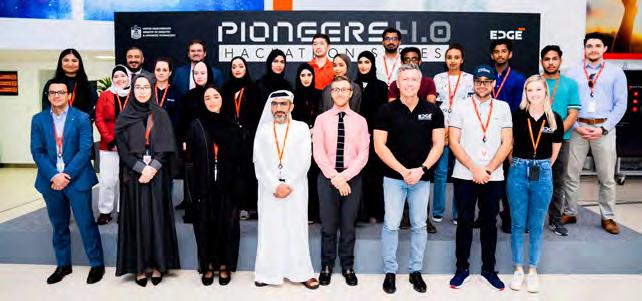
5G
GCC to reach 86% of total connections by 2028 forecasts EricssonNicolas Blixell, Vice President and Head of Gulf Council Countries at Ericsson MEA.
Yango Deli Tech, a global tech company that provides proprietary technologies and expertise for retailers as well as Q-Commerce, goes live across the GCC. The company assists traditional retailers and marketplaces to transition from a brick-and-mortar format to an online business model, significantly improving fulfilment and delivery processes while also enhancing operational effectiveness. The tech stack was proven earlier at a scale of profitable rapid grocery delivery business with over 450 dark stores.
Yango Deli Tech can benefit retailers, Q-commerce, and marketplaces, enabling these companies to deliver goods on-time and in-full, in turn raising profitability and overall

efficiency. For traditional businesses, this means an opportunity to advance the current business model from offline to online, at the same time avoiding unnecessary costs of maintaining non-core functions. Yango Deli Tech’s tech stack allows businesses to scale faster, leapfrogging the competition. It supports a variety of delivery options, including ultra-fast delivery, and is also suitable for different types of client’s interfaces.
The tech stack includes a variety of solutions for fulfilment, commerce, delivery, client experience and analytics. Among the proprietary technologies are warehouse management systems and assortment management, stock tracking and product replenishment, technologies for assigning orders to couriers, smart routing solutions, as well as applications for customers, pickers and couriers.
ArupPlus, a pioneer in mobile value-added services in the MENA region and emerging markets, announced it has achieved success in the field of digital distribution with over 1 billion views and streams on songs circulated by the company on YouTube and digital platforms this year. The company has successfully distributed hundreds of songs by Egyptian, Lebanese, and Gulf singers, as well as various Algerian singers, in 2022, most notably Ramy Sabry, Ruby, Tamer Ashour, Tamer Hosny, Wael Jassar, Mostafa Kamel, and Mohamed Kammah, and others.
ArpuPlus aims to strengthen its path of fostering arts and talents, as well as increase its
popularity in the digital music distribution market in the region by enhancing the presence of independent artists in the region, who want their records to reach listeners and music enthusiasts around the world. In order to help artists to achieve success, ArpuPlus has developed a strategy that is centred on utilising digital innovations for the benefit of art. The company handles digital distribution around the world through all digital music apps and platforms – including, Anghami, Spotify, Apple Music, Huawei Music, Twist Music, and others.
ArpuPlus is also the largest distributor of call tones in the MENA region, as it collaborates
Rania Adley, Content Distribution Manager, ArpuPlus.
with over 40 mobile operators regionally and globally. This allowed the company to distribute over 400,000 call tones in Egypt, North Africa, the GCC region, Italy, Canada, and the USA, for a number of prominent artists and singers – including Mohamed Mounir, Asala, Ziad Bourji, Bahaa Sultan, Elissa and Saad Lamjarred. In this context, ArpuPlus successfully achieved a growth rate of 30% in call tone distribution compared to last year.

ArpuPlus achieves 1 billion views through digital distribution of YouTube content in MENA
E-grocery deliveries can be doubled through Yango Deli Tech solutions estimates the company
From creating images for banners to generating headlines for articles, AI is fast becoming a mainstay feature of the marketing industry. For the
important part of it – CPA market – Admitad’s new AIassisted solution will save tens of thousands of marketer’s months in time and give them
instant access to millions of dollars in revenue.
Long payout times are one of the oldest and most obstructive problems faced by the CPA industry. Globally, partners wait an average of two months between a targeted action and receiving their rewards from an advertiser or online merchant.

Admitad, a performance marketing IT solutions provider, has found a way to solve this problem for good –with the help of AI.
Using machine learning technology, Admitad has developed a system that allows partners to withdraw their payout only one day after a targeted action’s completion – Instant Payout Pro. This allows partners to be quickly remunerated without having to wait for the approval or paycheque from advertisers.
The company will invest $10 million into the further development and roll-out of rapid withdrawal mechanisms.
UAE-based smart and green facilities management company Farnek has expanded its reach in the key banking sector, with a host of new and retained contract wins, throughout the UAE, valued at more than AED 12 million annually. The company has mobilised 72 members of staff stationed in locations across all seven of the Emirates, with the majority deployed in banks in Dubai, to carry out general cleaning, AC duct cleaning, administrative assistance, data centre cleaning, security and other specialised FM services.
Farnek’s portfolio of clients in the banking sector now include Mashreq, United Arab Bank,
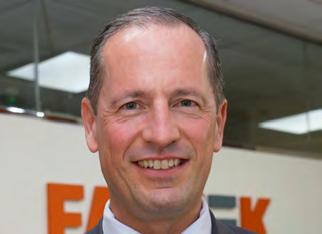
Commercial Bank International, Bank of Singapore, Al Ahli Bank of Kuwait, and ING Bank, to name a few.
Farnek’s service teams are divided into cluster groups for a quick and smart response, which reduces downtime and adheres with key
performance indicators. Their entire scope of work is managed by CAFMTEK a mobile-enabled, computer-aided facility management software solution, that provides their technical teams with a holistic view of their operations.
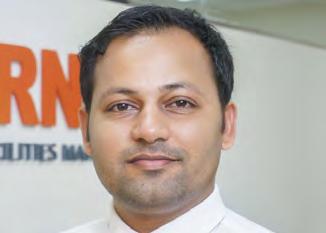
Farnek expands services to banks in seven Emirates using computer-aided FM solutions(Left to right) Markus Oberlin, CEO Farnek; and Zohaib Azhar, Head of Operations, Farnek.
Admitad develops system allowing partners to withdraw payout one day after action completion
Azizi Developments, a private developer in the UAE, is advancing swiftly in its digital transformation journey, to the benefit of all of its stakeholders, particularly its investors and end-users. The digitisation of Azizi’s facility management processes is now complete, with them being fully integrated with its CRM department and with work orders now being entirely
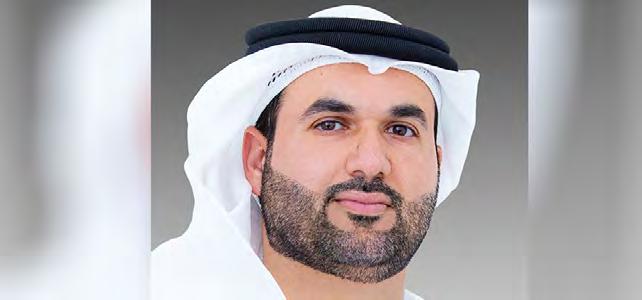

automated. This has increased efficiency significantly, and has reduced the completion time of open-to-close cases by over 50%.
The developer’s leasing processes have now also been fully automated, giving clients more visibility and ensuring a higher degree of transparency, all while eliminating human error.
Moreover, with the implementation of higher
speed internet and unlimited data, work efficiency has increased substantially, while average turnaround time in most departments, including Azizi’s CRM teams, has been cut in half.
The developer has also overhauled its snagging processes. Work orders being raised, resulting from inspections, are now being responded to more than 60% faster via a newly implemented tool. Furthermore, technicians are now being assigned using geo location tracking, which has yielded a substantial decrease in response and closure times.
Through its digital business transformation, Azizi Developments is improving its operational efficiency, end-products and services for its investors, end-users, brokerage partners, suppliers, as well as the governing authorities. In addition to faster turnaround times, Azizi’s customers benefit from greater convenience, superior customer service and increased ROIs.
average of 7,000 prescriptions a day. Additionally, MoHAP revealed that the total value of financial insurance claims processed through the platform has crossed AED 1.2 billion. The E-Claims Post Office is accessible by more than 6,000 doctors, 40 paying agents, and 1,000 health care facilities such as hospitals, clinics, pharmacies, and health care centres.
The Ministry of Health and Prevention has announced that more than 4 million insurance claims have been processed in the past eight months only through “Riayati”, the digital healthcare platform for the National Unified Medical Record program, with an average of 28,000
transactions a day.
The ministry also announced that since the launch of the platform on April 1, 2022, more than 4.9 preapproval requests have been issued, an average of 26,000 requests a day, while over 1.4 million electronic prescriptions have been provided, an
The ministry said that it is committed to improving patients’ journeys and providing innovative digital solutions in the field of health data management, in order to establish a smart and integrated health system that serves all stakeholders, tightens control over health insurance procedures, and ensures a balanced consideration of financial resources.
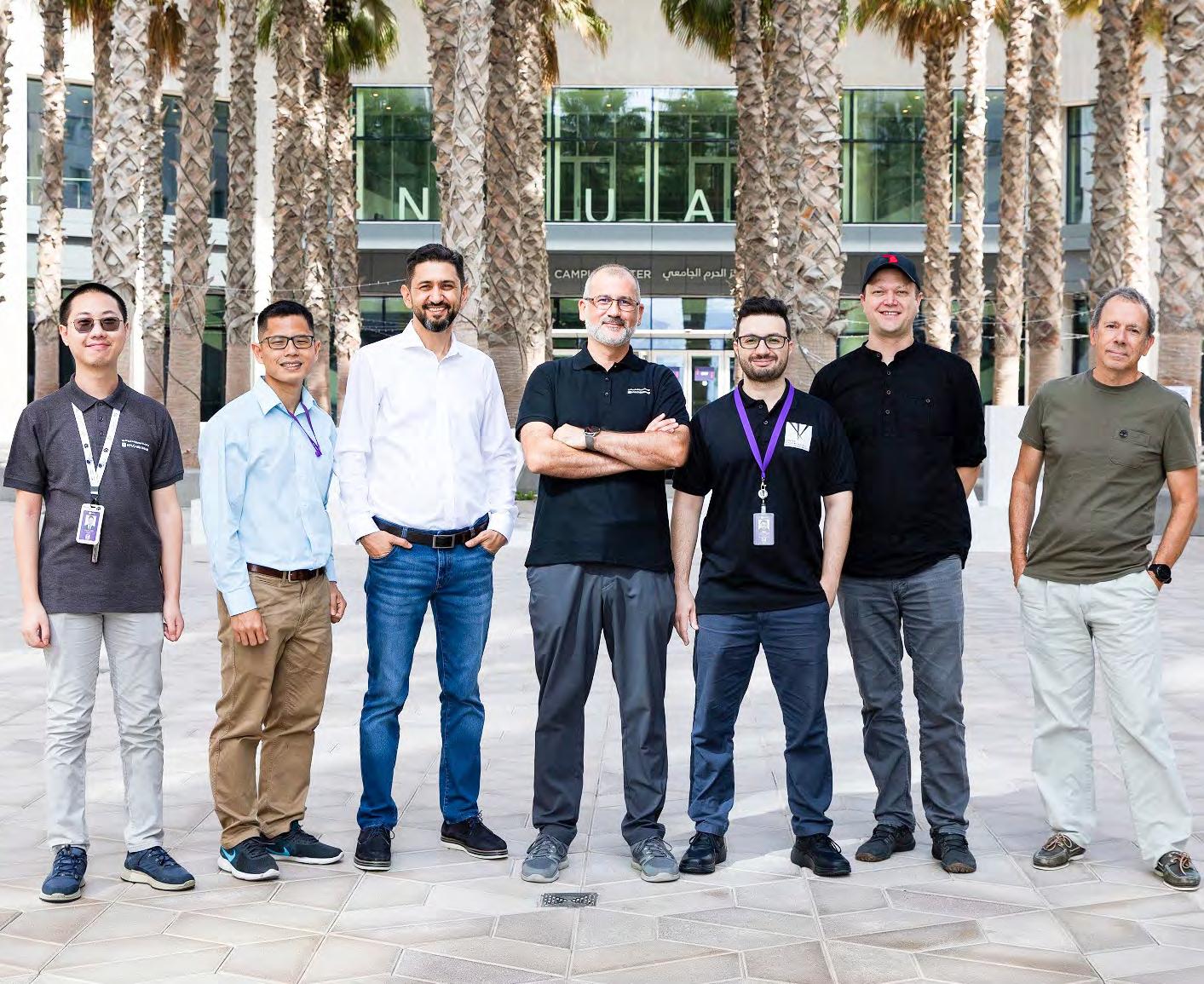
The UAE has officially embarked on its muchanticipated lunar mission, making it the firstever Arab country to reach this milestone. The Mohammad Bin Rashid Space Centre’s lunar rover, Rashid, has launched from Cape Canaveral, Florida, through ispace’s Hakuto-R lander as part of its program HAKUTO-R MISSION 1, with the journey to the moon estimated to take about four months.
Built by Emirati engineers and named in honour of Dubai’s late ruler Sheikh Rashid bin Saeed Al Maktoum, Rashid aims to study various aspects of the lunar’s surface. The four-wheel rover “will conduct numerous scientific tests on the surface of the Moon that will contribute to making qualitative developments in the fields of science, communication technologies, and robotics. Furthermore, the impact of these developments will extend beyond the space sector and into various vital sectors in the national and global economy,”
MBRSC stated on its website.
Several institutions in the UAE and across the globe have contributed to the mission. NYUAD was a key contributor to the mission by participating in the development of the rover’s instruments and the relevant data processing procedures, measuring critical properties of the rover, as well as supporting the landing site selection.
Representatives from NYUAD include Lecturer of Physics Milan Bogosavljević, Research Scientist at the Center for Astro, Particle, and Planetary Physics, CAP3 Mohamad Ali-Dib, Professor of Physics and Principal Investigator at CAP3 Francesco Arneodo, undergraduate student Sebastian Kalos, Postdoctoral Associate Laura Manenti, Assistant Professor of Civil Engineering Kemal Celik, Research Scientist Rotana Hay, Research Assistant Bo Peng, Senior Lecturer of Engineering Design Matthew Karau, and CITIES Research Fellow Vince Nguyen.

The Dubai International Financial Centre Courts announced the launch of a new set of industryfirst specialised Rules for its recently formed Digital Economy Court Division.
In addition, leading international judicial expertise has been recruited to oversee and operate the new Court’s cuttingedge digital infrastructure and
service capabilities. Under Decree No. 29 of 2022, His Highness Sheikh Mohammed Bin Rashid Al Maktoum, Vice President and Prime Minister of the UAE, has appointed Justice Michael Black of England and Wales, who will oversee the Digital Economy Court Division.
Following the announcement of the dedicated Division in 2021,
a global panel of lawyers, led by Tom Montagu-Smith KC and Matthew Watson of 3VB Chambers, and industry experts, were tasked to draft and confirm new specialised Rules, which were also subject to a 30-day public consultation and finalised under the supervision of Justice Michael Black.
In line with the Courts’ paperless mandate, cases will also be conducted using advanced digital systems to expedite service to parties and enforcement, with a view to reducing the environmental impact of court proceedings.
In 2021, the DIFC Courts established the Digital Economy Court Division to oversee sophisticated national and transnational disputes related to current and emerging technologies across areas ranging from big data, blockchain, AI, fintech, and cloud services, to disputes also involving unmanned aerial vehicles, 3D printing, and robotics.
Transtek Systems has signed an alliance agreement with KPMG Lower Gulf, introducing a cutting-edge technological tool, Mojodat and enhancing the Tangible Assets Management offering to its clients. Transtek Systems is a UAE software company, founded in 2000 and has been since supporting small, medium, enterprise corporate and governmental organisations in their digital transformation across the MENA region by solving their pain points with a wide range of innovative software solutions.
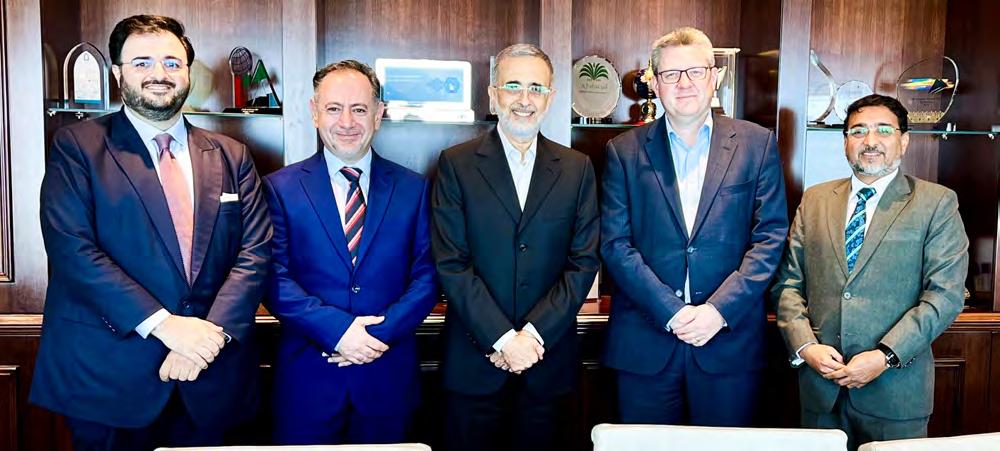
xPU technology is an enabler for scale and exponentially improves performance and drives digital transformation through a specialised piece of hardware.
Hardware enables software; therefore, hardware enables digital business. Without hardware, neither can succeed.
Utilising the right hardware should be just as important to an organisation as the platform and network they choose. Why? Because performance continues to remain supreme, and the performance of digital business hinges on utilising the best technology to meet demand. Selecting appropriate hardware enables efficiency in cost, in power to operate, and in agility. Today’s xPU technology is the enabler for economies of scale,
because it exponentially improves performance and drives digital transformation through a specialised piece of hardware, containing specific acceleration functions in silicon that are meaningful to networking and applications. But to leverage the maximised computing and processing power of xPUs, organisations need to modernise their enterprise architecture around their applications.
If you are reading this, I would like to assume you have heard of Moore’s Law. However, in the event that you have not, it should be clear
that Moore’s Law is not a law; it is more of a prediction, one that happened to ring true for roughly 50 years.
In 1965, Gordon Moore of Intel calculated that the number of transistors per integrated circuit, a CPU, would double every year as technology advanced, delivering exponential improvements to processing power. He later amended this to be a doubling every two years, but over time the numbers worked out more closely to every 18 months.
Over the past decade or so there has been a slowing in the CPU improvements provided by hardware updates, which has led to many claims that Moore’s Law is dead or dying. But those claims are based too directly on the doubling of components on the raw silicon and improvement of general processing.
It’s true we are approaching a point at which hardware components cannot get any smaller, thanks to the underlying physics, but that does not mean computing and processing improvements are stagnating. The remedy to our CPU obstacle is specialised hardware, xPU, designed to handle specific software needs.
Think of a CPU like your standard chef knife. It’s versatile and capable of doing all the work needed to cook and serve a meal, albeit with some inefficiencies. Specialised compute, the GPU,
l To leverage maximised computing and processing power of xPUs, organisations need to modernise their enterprise architecture around their applications.

l The remedy to our CPU obstacle is specialised hardware, xPU, designed to handle specific software needs.
l Selecting appropriate hardware enables efficiency in cost, in power to operate, and in agility.
l The enterprise architecture must be designed to maximise the hardware’s capabilities for the software it hosts.
data processing unit, and xPUs of today, is equivalent to the precision pieces found in your knife block, such as a filet knife, meat cleaver, and kitchen shears. When utilised in addition to CPUs, they provide greater speed and efficiency in the process of preparing and serving a meal, enabling the cook to scale out their offerings.

While we may not continue to see a doubling of transistors and general CPU power every 18 months past certain physical boundaries, precision or domain-specific hardware performance capabilities continue to enable exponential improvements. This effectively extends Moore’s Law past general purpose compute, provided the software and architecture are designed to take advantage of the accelerated functions available inside an xPU’s capabilities.
In the past, the doubling of transistors and compute power inside of general-purpose CPUs was enough to adequately accelerate performance. Today, however, it’s the pairing of precision hardware with software designed to leverage its special computing capabilities that improves the operational experience.
Designing an application with CPU in mind means developers need to be cautious about data needs as it will affect the speed, quality, and performance of the application. However, creating an application with a data processing unit in mind means the application can be designed to take advantage of faster data processing, while simultaneously using less power.
Referring to our earlier analogy, it’s like a chef using a meat cleaver to prepare a chop instead of a standard chef knife;
they save time and energy.
But inserting a top-ofthe-line data processing unit into a data centre will not simultaneously optimise data processing and enable observability. The enterprise architecture must be designed to maximise the hardware’s capabilities for the software it hosts, meaning hardware itself must be thought of as an essential architectural component.
Watch a TV show or movie from the 90s on one of today’s 4K UHD TVs and you will have a visual representation of software not designed to take advantage of the hardware. And trying to place one of today’s 4K processors in an old CRT or rear-projection TV will not give viewers the upgraded experience they desire, since the system was not architected to capitalise on such technology. Only the proper pairing will give you the best visual.
Similarly, current enterprise architectures were not developed to leverage the capabilities of today’s xPU hardware. Organisations are preparing to launch their digital transformation journey with modern software atop the hardware of the past, and this can only lead to future failure. n
Hardware itself must be thought of as an essential architectural component
The Everyday AI model calls for transparency and a breakdown of information and departmental silos and earlier projects share their costs across all those that follow.
These days, every regional business leader spends at least some of their time each day thinking about AI, its uses, its implications, its potential. The United Arab Emirates, can be thought of as a pioneer in artificial intelligence. It was the first country to appoint a minister of state to oversee the field. It is home to organisations like Dubai Electricity and
Water Authority, and e& that use bots for customer service. And it has a National Strategy for Artificial Intelligence.
Enterprises here have even shown a willingness to commit to the deep and broad culture changes required to deliver Everyday AI, where AI becomes second nature to the entire workforce.
But despite the will of the innovators, AI


projects can be stubborn when it comes to delivering their expected value. According to a March 2022 global report from Gartner, the ROI on AI projects varies from 20% to more than 800%. The problem arises from early cases classically being quick wins. The law of diminishing returns then applies to subsequent initiatives, but this is aggravated by increasing maintenance and execution costs.
So, the challenge for organisations that want to create an Everyday AI culture becomes controlling costs while deploying at scale. There are three main steps to reducing the costs associated with AI projects.
l AI projects can be stubborn when it comes to delivering their expected value.
l Law of diminishing returns applies to subsequent initiatives, but this is aggravated by increasing maintenance and execution costs.
l Every project is broken into manageable chunks for ease of implementation.

l In IT solutions development, everything from the smallest code snippet to data cleaning can be repurposed and reused.
l Within an Everyday AI enterprise, there will be professional coders who will know the basic resource economies that accompany reuse.
l Citizen developers may need training in how to build code libraries and consolidate work into a repository for future reuse.
Every project is broken into manageable chunks for ease of implementation. In IT solutions development, everything from the smallest code snippet to data cleaning and even entire solutions can be repurposed and reused. Within an Everyday AI enterprise, there will be professional coders who will know the basic resource economies that accompany reuse.
But there will also be citizen developers who may need training in how to build code libraries and consolidate work into a repository for future reuse.
When it comes to datacleaning and preparation, the repository model does not apply directly but the basic concept is the same. Prep work is labourintensive, and organisations should devote some time to ensuring such tasks are
not repeated. A centralised catalogue of prepped data, similar to code libraries, will save a lot of time.
It makes sense to procure tools and establish rules and processes that ensure data can be prepared, and code written, just once and used many times. This can be of particular use to nontechnical business users who would otherwise have to wait for a developer or data scientist before creating value.
Once reuse procedures are nailed down, earlier projects can share their costs across all those that follow. The Everyday AI model calls for transparency and a breakdown of information and departmental silos. If we follow this concept and combine it with the newly introduced practice of reuse, we could envisage a
marketing
Tools are out there to facilitate openness and allow roles, from most experienced data scientist to business analysts with basic spreadsheet skills
employee taking a use case developed in the customer service function and building something else of value on top it with only a fraction of the effort that the original required.
This is the value of transparency. Of knowing what others have done and how it applies to the next use case and the one after that. And the tools are out there to facilitate such openness and allow all roles, from the most experienced data scientist to business analysts with basic spreadsheet skills, to feel the power of AI. This is often referred to as data democratisation and is a critical pillar of Everyday AI.
AI projects do not tend to be linear, and they involve a rich community of job titles. If this pipeline is improperly managed, repetition is bound to occur, and keep occurring. There are three main areas where simple efficiency can help control costs.
for an efficiency overhaul is architecture changes, including changes to AI tools themselves. A scalable approach to architecture that allows for the adding of new users, including citizen developers is required to ensure that the Everyday AI culture will last. Cloud-native AI platforms are the answer here, especially those that can integrate easily into a hybrid workspace.
Controlling costs may just be the first step in the road to Everyday AI, but it is a vital one. Spiralling expense will erode confidence, and culture changes are difficult enough without giving naysayers the opportunity to point at waning balance sheets.
This is the value of transparency, knowing what others have done and how it applies to the next use case
The first is operationalisation, where AI solutions are released into the wild. Packaging and deploying take time and in an Everyday AI culture these releases can run into the hundreds. If possible, enterprises must make one-click deployment available to all professional and citizen developers.
The second, once deployed, a model must be maintained to ensure it remains effective and does not, in the worstcase scenario, do harm to the business. MLOps is one way of controlling the cost of maintenance, by turning it into a systematised, centralised task.
The third area to consider
But controlling costs while operating at scale requires removing friction. The right AI platform will allow everyone to become a stakeholder. Each employee should be able to see the products and successes of everyone else. Data experts should be able to share data treatments and even entire AI projects in easy-to-reuse formats. And no matter their role, every developer of every model should be trained in how to reuse the work of others and how to make their work reusable.
It also helps greatly if the AI platform offers the means to implement AI governance to ensure quality and compliance and check whether a project aligns with business goals.
Without the proper preparation and strategy, the costs of AI projects can quickly get out of hand, defeating the purpose and preventing widespread buy-in. But follow the simple steps outlined here, and Everyday AI may be closer than you think. n
The ROI on AI projects varies from 20% to more than
according to Gartner



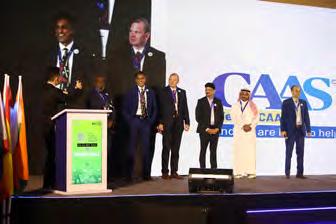
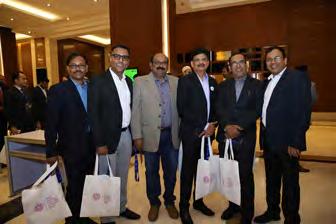



The biggest ever edition of the Formula 1 Abu Dhabi Grand Prix Weekend closed with reigning world champion Max Verstappen crossing the line with his 15th win of the 2022 season. Oracle Red Bull Racing’s Verstappen showed no signs of complacency as he cruised to victory from pole position at Yas Marina Circuit. Honda Racing Corporation provides technical support to the Oracle Red Bull Racing team and will continue its collaborative support towards the team in the 2023 racing season. Fans also witnessed four-time World Champion Sebastian Vettel in an F1 car for the final time with the German signing off his career after his 300th race, finishing with a point in 10th place.
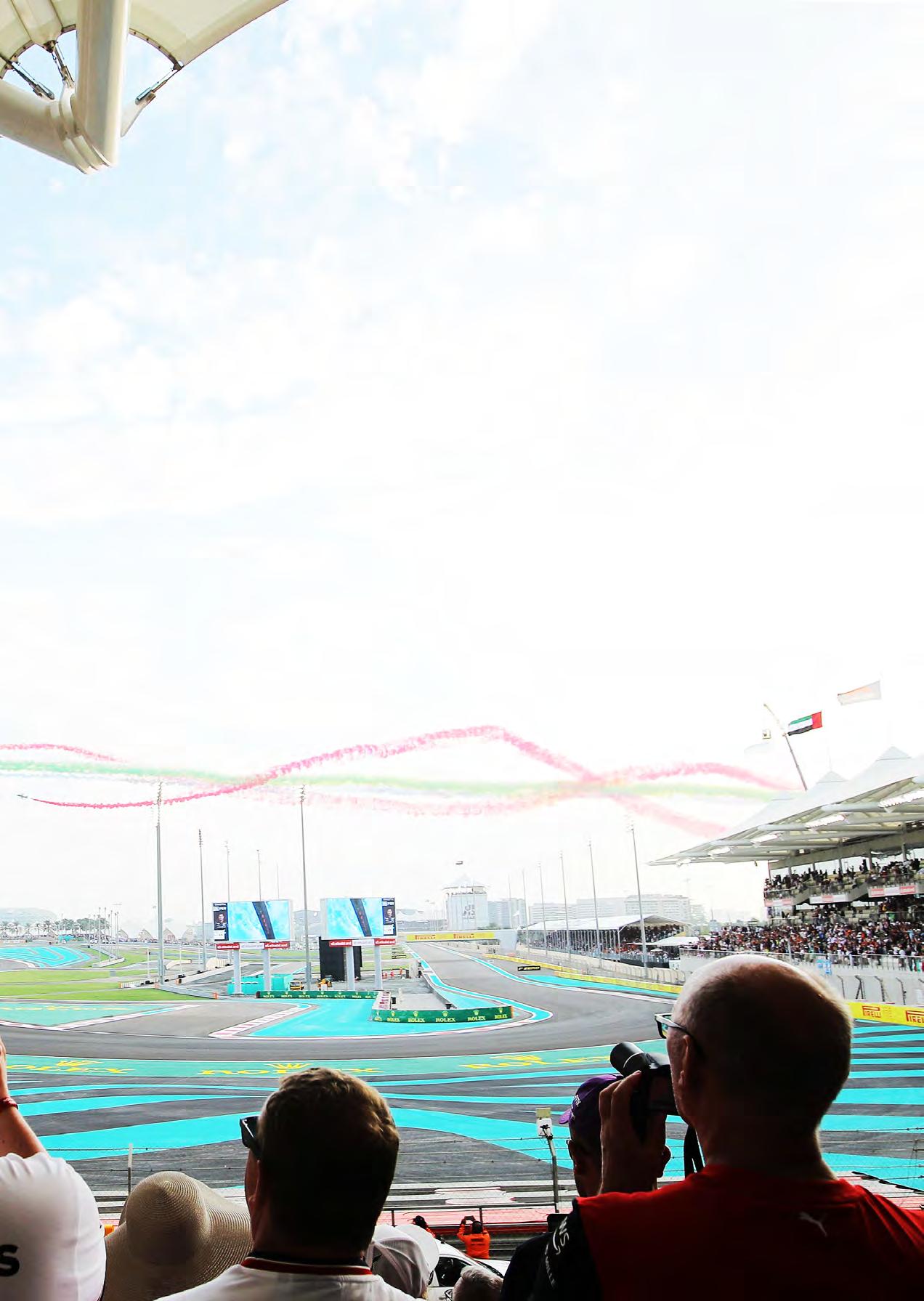
Hero MotoCorp has been confirmed as the new Title Partner of the Dubai Desert Classic, the second Rolex Series event of the 2023 DP World Tour season. The iconic tournament returns to Emirates Golf Club in late January and will once again boast a field headed by World Number One and two-time Dubai Desert Classic winner Rory McIlroy.

The New Delhi headquartered Hero MotoCorp is the world’s largest manufacturer of motorcycles, in terms of unit volumes sold by a single company in a year. It has held this position for the past 21 consecutive years. The Company has sold 100+ million motorcycles and scooters in cumulative sales since its inception.
The Hero Dubai Desert Classic, first held in 1989, is the oldest professional golf tournament in the Middle East and has established itself among the most highly anticipated events in the region, showcasing the best talent from around the world and up-and-coming golfers.
Played on the Majlis course at Emirates Golf Club, the tournament is supported by Emirates Global Aluminium, who is a founding partner of the Dubai Desert Classic and the world’s largest premium aluminium producer as well as the biggest industrial company in the UAE outside oil and gas.

Emirates NBD, a banking group in the Middle East, North Africa and Turkey region, announced strategic changes to its Group Executive Committee, including expanding the responsibility of existing senior management team members.

Veteran banker Suvo Sarkar, Group Head of Retail Banking and Wealth Management will retire after a successful decade-long tenure at Emirates NBD, underpinned by his deep banking knowledge, steadfast temperament, ability to inspire others and relentless focus on innovation.
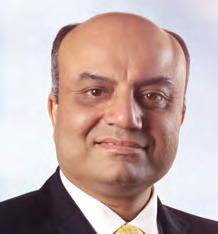
Marwan Hadi has been appointed Group Head of Retail Banking and Wealth Management and a member of the Group Executive Committee, succeeding Suvo Sarkar. Ahmed Al Qassim, currently Group Head of Corporate and Institutional Banking and member of the bank’s Group Executive Committee, will expand his role to include Global Markets, Treasury and Research to become the Group Head of Wholesale Banking.
Ammar Al Haj has been appointed as Group Treasurer and Head of Global Markets. Formerly serving as Senior Executive Vice-President and Group Head International and Group Strategy, Neeraj Makin, will now be responsible for leading the bank’s newly approved Corporate Venture Capital Fund.
Network International, enabler of digital commerce across the Middle East and Africa region, has announced the appointment of Sandeep Chouhan as Group Chief Business Transformation and Technology Officer.
Bringing global experience in spearheading Business and Technology Transformations at some of the world’s leading financial institutions and payments businesses, Sandeep will be responsible for driving Network’s groupwide strategic transformation to accelerate business growth, operating efficiency and innovation in processing and acquiring products, as well as reducing timeto-market for banks, merchants and fintechs.
TEXUB, the global digital B2B marketplace, having established a significant presence in the Middle East, Asia and Europe, is now expanding in CIS and Central Asia with the appointment of Vitaliy Kanter as the company’s Vice President of Sales for the CIS region. This leadership shift in CIS and Central Asia teams will empower TEXUB to focus on new growth strategies. In this role, Vitaliy will head up its CIS sales and operations, facilitating clients to continue to expand and grow with TEXUB.

Sandeep Chouhan joins Network International as Group Chief Business Transformation and Technology Officer
Vitaliy Kanter joins TEXUB as Vice President of Sales for CIS region
London-based consumer technology company Nothing, announced the appointment of Rishi Kishor Gupta as Business Lead for its Middle East operations. Rishi, a veteran in the consumer technology space with over 15 years of experience, will be responsible for driving growth in the highly-competitive market, and spearheading business development and operations for Nothing in the region.

With his vast experience in retail and international consumer markets, Rishi was instrumental in establishing Huwai’s operation and spearheading its strategic growth in the Middle East.
Al Khoory Hotels, part of the Al Khoory Group’s hospitality division, has made two senior management appointments to drive the next phase of the company’s growth in Dubai. Seasoned Hotel Manager Dhiraj Bagai will utilise nearly 20 years of hospitality experience to lead the recently launched Al Khoory Courtyard Hotel, where the focus will be on showcasing the quality accommodation, facilities and amenities twinned with exceptional value, and the Urban Al Khoory Hotel where he will underscore the brand’s innovative, vibrant and modern credentials.
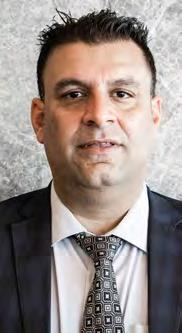
Also joining the Group is Naji Moukhachen, who takes up the position of Head of Sales for the Hospitality group. A graduate of Cornell University and an MBA from the Swiss Business School, he has over 12 years of hospitality experience in senior sales positions, having established numerous successful strategies for a series of hospitality brands in the UAE and internationally.
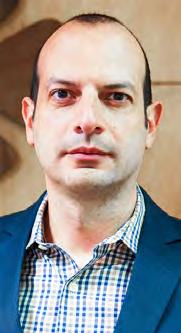
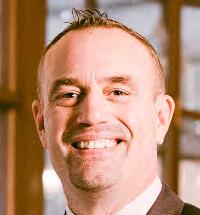
Yas Plaza Hotels has appointed hospitality veteran Fredrik Reinisch as its new Managing Director. Taking the helm at Yas Plaza’s six international hotel brands, Fredrik is bringing with him over 20 years of experience with leisure properties in the UAE region. Prior to his appointment at Yas Plaza Hotels, he has served as Complex General Manager for Al Habtoor City Hotel Collection and General Manager of Habtoor Grand Resort Autograph Collection, along with his stint as Regional General Manager of JA Resorts and Hotels for the UAE and Seychelles.
An ambitious and strategic business executive, Fredrik has proven abilities in strategic planning, revenue management, and project management, improving the efficiency of operations and implementing strategies and policies to optimise profitability.
He is also a driven project leader with extensive pre-opening, rebranding and refurbishment experience, leading the rebranding of Al Habtoor City into three different Hilton brands including the first ever luxury branded LXR by Hilton, Habtoor Palace, LXR.
Etihad Airways announced appointment of Raffael Quintas as Chief Financial Officer. Prior to joining Etihad, Quintas served as Chief Financial Officer at Infracommerce, the largest e-commerce enabler and solution provider in Latin America. He also previously held the Chief Financial Officer role at Portuguese flag carrier TAP Air Portugal and the Corporate Treasurer position at Brazilian airline Azul Linhas Aéreas, where he took on roles of increasing financial responsibility during a nine-year tenure.
Quintas holds a degree in Business Administration from Fundação Getulio Vargas and an MBA from the Kellogg School of Management at Northwestern University. Quintas will be succeeding Adam Boukadida, who has left Etihad after nine years to pursue a new role.

stc pay’s Board of Directors announced the appointment of Nizar Abdulaziz Altwaijri as CEO of stc pay. Nizar Altwaijri has 25 years of experience in the financial and banking sector in which he has assumed various leadership positions, the most recent was Deputy Managing Director at the Arab National Bank since February 2021.
Altwaijri is one of the distinguished experts in the Kingdom’s banking sector. Throughout his career, he gained a rich experience in strategy & business development. At the same, Altwaijri has attained a comprehensive vision in the financial technology and investment fields.
Altwaijri holds a Master’s degree in Business Administration (General Administration) from University of Maine, USA and a Bachelor’s degree in Information Systems from King Saud University, Riyadh.
Azizi Developments, appointed a new Chief Facilities Executive and Senior Advisor, Dr Mahmoud Reza Taheri, to lead its Facility Management & Commercials, DLP and Security Services.
Dr Mahmoud, a veteran in the industry, has over thirty years of experience in management and operations, and has a proven track record in effectively leading high-performing teams, developing and streamlining processes, and implementing avantgarde systems to boost efficiency and optimise productivity.
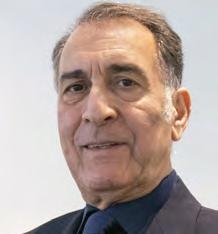
Dr Mahmoud has served as Deputy Special Envoy as well as Head of Missions along with other key positions in the specialised agencies of the United Nations. Dr Mahmoud has also taught as a university professor, and holds two PhD degrees in social communication sciences and international relations. Moreover, he has served as CEO of Azizi Investments from 2007-2012. Dr Mahmoud is an expert in facility management. Hired to help Azizi’s projects reach their fullest potential, he will be overseeing those who operate and maintain Azizi’s completed projects.
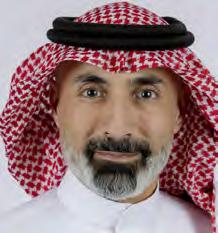
Raffael Quintas moves from Infracommerce in Latin America to Etihad Airways as CFO
Nizar Abdulaziz Altwaijri moves from Arab National Bank to join stc pay as CEO
Dr Mahmoud Reza Taheri to lead Facility Management Commercials at Azizi Developments


